#Psychological Analysis
Text
The Psychological Analysis of Jason Todd
I am a psych major, and my professor is allowing us to make an analysis of any character of our choice, so I figured who better to write then Jason Todd. This was very fun to write and I very much enjoyed rewatching Batman: Arkham Knight. Please enjoy. ☁️ Warning(s): Trigger Warning for Trauma, Mental Health Content, Violence, Graphic Imagery, Spoiler(s)☁️ Word Count: 2.6k ☁️: Authors Note: I am working on fanfics, more headcanons for Arkham Jason, unfortunately I am busy with classes, assignments and deadlines. I will try to be punctual but it may take time. Thank you for your understanding.
Introduction
Jason Todd is the secondary villain in Batman: Arkham Knight, which has the same moniker. He is the second Robin and Bruce Wayne's adoptive son.
Jason Peter Todd was born in the slums of Gotham City to two drug-addicted parents, who would eventually try to settle a debt they had by giving Jason away when he was a baby. Jason received no parental figure to help guide him, leading him to petty crimes such as theft to nourish his survival. Jason is a character who takes what he needs if it means prolonging his survival; his lack of a parental figure leads him to an identity crisis between longing for a parental figure and convincing himself he is better off without one. When the simple truth is that every human needs a mother and a father, we respond positively to a nurturing environment, and through early adolescence, our brains crave the structure needed to build us into well-rounded adults.
At fifteen, Jason inadvertently met Batman while committing robbery when Batman was fighting Gotham's notorious supervillain, The Joker. Believing Batman is in trouble, Jason jumps between pushing the hero from harm's way. Despite life's misfortunes, Jason possesses a remarkable code of morality enough to want to save someone. Jason, attempting to rid Joker of his breath, aims a pistol at the clown and, before firing, is knocked out of his hands by Batman's batarang. Unfortunately for him, Joker would leave Jason with a cryptic message, one for the young man to head.
Jason would later be apprehended and taken into custody in the back of a police car by Batman after Batman retrieved his gun and stolen money. However, rather than being charged, Jason receives a blessing through a Wayne Industries project that helped troubled teens; through the program, Jason was able to turn his life around. All attract the man who helped Jason find a new purpose: Bruce Wayne. Months after being released, Batman appeared in Jason's dorm, again offering Jason another opportunity.
2nd Robin and Kidnapping
Taking Jason in as his ward as well as dubbing him Robin after Dick Grayson, Jason sought justice and enjoyed being a hero. Like the previous Robin, he showed a keen aptitude for it; unlike his predecessor, he possessed a fiery temper and willingness for more lethal force. While Jason's temper is directed towards the criminals that harm the innocents, Batman views this as inexcusable, fearing the day that Jason will kill instead of reprimanding.
In the most twisted sense of irony, Jason's morality inevitably becomes his downfall. The Joker has blown up a school with kindergarteners; this leads to Jason's resolve that Joker needs to die. Knowing that Bruce would try to stop him, Jason abandons his comms and tracker so he can kill Joker. However, it is a trap, and Joker ambushes Jason. Jason was kept in a wheelchair, bonded by barbed wire that kept Jason leaning hunched over in excruciating pain. Throughout his pain, Jason's mind remained still; he was confident that Batman would find him; his sheer will at the beginning of his torture is, with all honesty, remarkable as Joker has been known for his mental abuse and mind games he plays with his victims including his sidekick, Harley Quinn.
In the six months of his torture, Jason's unwavering mental resolve was slowly crippling as Joker had wanted; throughout the game, Jason's voice mixed with crippling fear and small doubts about Batman coming. The Joker feeds into his doubts by showing him a photo of Batman with his replacement, Tim Drake. This leaves Jason troubled as he slowly loses hope for Batman.
The last act of Jason's torture involved a video sent to Batman via The Joker of Jason, who has undergone all his brainwashing; in the video, Jason is sitting down in a chair; he is not chained, barbed, handcuffed, or kept sitting still in any way by all means Jason could easily walk away. This is a significant and crucial part of Jason's torture as it symbolizes just how much mental anguish and emotional exhaustion Jason went through to the point that he no longer had a yearning for freedom—making him downright timid and submissive towards Joker enough to out Batman's identity when asked by the latter. This results in Joker shooting Jason point-blank in the chest, as Joker "never could stand a tattletale." However, this was only a ploy to make Batman believe Jason is genuinely dead.
On the contrary, Jason was kept alive for another year, endeavoring more torture, mistreatment, and malnourishment. Harley Quinn did the final touches of Jason's emotional and mental brainwashing; a former psychiatrist who manipulated Jason into believing that Batman was the cause of his anguish and his pain was his doing; she did this long enough, even punishing Jason by waterboarding him and electrocuting him when he refused to say Batman, indicating he still had some level of awareness of who was torturing him.
However, once Harley could get Jason to say Batman's name, Jason was drugged and beaten by two prisoners dressed like Batman; he was given a gun by The Joker and was ordered to kill them. Jason's resolve and humanity were a cord, still entrenched in him before Harley convinced him further, snapping his humanity and getting him to shoot the two dressed-up prisoners dead.
During the riots of Arkham Asylum, The Joker paid mercenary Deathstroke to keep Jason there and shoot him if he escaped. However, Jason convinces Deathstroke that Joker will not keep his promise and that if he helps, Jason will triple whatever Joker plans to pay. Accepting the offer, Deathstroke assists Jason in escaping, stealing a helicopter, and flying to Wayne Industries. Jason steals millions of dollars from his former guardian. Ironically, crossing paths with Tim Drake, who assumes Todd to be Deathstroke's sidekick, when Jason's ankle is caught between Tim's grappling hook, Jason cuts the cord, allowing Tim to fall when suggested by Deathstroke that killing Robin would bode well for them with the Dark Knight. Jason Coldy says that if he dies in a fall like that, Batman needs to pick his sidekicks better.
Jason's psyche has been torn and scattered, leaving him a hollowed carving with a mocking J branding etched onto his face, from birth his eyes were already met with darkness, born to parents who never showed him recognition, let alone love, and through the Wayne Industries Project and his adoption by Bruce his eyes were wide, and remarkably hopeful, to be free of the weight of Gotham's misfortunes finally; those eyes that looked with gleam forced shut until he saw nothing but blackness.
Arkham Knight's Birth
Jason adopts a new persona built on the pain and suffering in the wake of his escape from Joker. He feels betrayed by the one person he only had in the world and wants vengeance. Jason works alongside Scarecrow, one of Batman's enemies. The two begin a plan on Halloween to take Gotham and Batman's legacy along with it. Jason gathers all Batman's enemies to join, assembling a militia with Deathstroke. While working with each other, Scarecrow "tests" his fear toxin on the young man, sending him on a psychological spiral. One of his more apparent fears is the Joker, who can be found near, in the background, or standing right in front of him laughing and mocking him, but beyond the clown prince of crime's appearance, Jason also sees his replacement, Tim Drake, and "fights" him.
The fight has Jason severely outnumbered in the beginning, with Tim succeeding, even using his staff to choke Jason, forcing him to the ground as the Jokers around him laugh. Further into the fear toxin, Jason appears in front of Wayne Manor, where he throws down his helmet and says the following: "Someplace warm, someplace safe, someplace where I'm needed, someplace where I'm loved," Joker once again appears in front of him laughing and mocking him on whether he even deserves it, this is Jason's internal struggle in a manifested form of the person who caused him harm, of the person who convinced him from the start that he was alone and would not be saved. Jason is mischaracterized as always being angry or standoffish, but anger has more truth than any lie detector can scoop. Jason feels this anger is not just because of some personality trait; anger is his cry out, and he's shouting to be seen and loved. This is most likely due to being tortured at 15 or so, which, despite the fact that at the time of Arkham Knight, he was in his early 20s, his mental age was regressed to the age when he was captured. This makes Jason appear at first glance as someone emotional, cocky, and arrogant. He values safety and love; he doesn't want to be on his guard 24/7, but he's grown up in an environment where letting your guard down gets you killed. He follows Joker into Wayne Manor, where he sees Bruce; suddenly, several versions of Batman appear in the room. They beat him and told him they never wanted a partner or even a son. This is a conflict that has always waged war in Jason's mind. Jason's biological father attempted to give him up and then belittled him when he explained that Jason's worth was so low that he couldn't even leave him; he has low self-esteem that he internalizes into rage in the way that he fights to prove his strength.
This is why Jason has a strong attachment to Bruce/Batman it maybe due to an underlying desire to seek his approval especially by the time when he adopts him. Bruce gives him everything he could ask for and anything he could think of, and Batman gives him a purpose. Ironically, this is still the case despite Bruce himself having an avoidant attachment style.
Conclusion and Diagnosis
Jason Todd's character in "Batman: Arkham Knight" exhibits a complex interplay of psychological factors that align with the diagnostic criteria for Borderline Personality Disorder (BPD). One prominent feature of BPD is emotional dysregulation, characterized by intense and rapidly shifting emotions. Jason displays various emotions throughout the game, from anger and hostility to vulnerability and despair. His reactions often appear exaggerated or disproportionate to the situation, indicating difficulty regulating his emotional responses.
Furthermore, Jason's sense of identity is notably unstable, which is another hallmark feature of BPD. Having grown up in a dysfunctional environment with absent parents, Jason lacks a stable sense of self and struggles to define his identity. This is evident in his adoption of various personas, including Robin, the Arkham Knight, and, later, the Red Hood. His shifting identities reflect a profound inner conflict and a desperate search for validation and purpose. Jason's interpersonal relationships also reflect the interpersonal instability characteristic of BPD. He forms intense and unstable attachments to figures such as Batman, vacillating between admiration and resentment. His interactions with other characters are marked by rapid shifts in perception, alternating between idealization and devaluation. For example, while Jason initially idolizes Batman as a mentor and father figure, his feelings of betrayal and abandonment lead to resentment and hostility towards him.
Moreover, Jason exhibits self-destructive behaviors as a coping mechanism for his emotional pain, another hallmark of BPD. He engages in reckless actions, disregarding his safety to seek vengeance against those he perceives as enemies. His confrontations with adversaries are often fueled by a desire for self-assertion and control, masking more profound feelings of emptiness and despair.
Underlying Jason's behaviors is a pervasive fear of abandonment, stemming from his traumatic upbringing and experiences of betrayal. This fear drives his desperate attempts to maintain connections with others, even as he pushes them away with his volatile and unpredictable behavior. Jason's fear of abandonment manifests in his interactions with Batman and the Bat family, where he oscillates between seeking their approval and rejecting their authority.
Jason Todd's character in "Batman: Arkham Knight" embodies many of the core features of Borderline Personality Disorder, including emotional dysregulation, identity disturbance, interpersonal instability, self-destructive behaviors, and a fear of abandonment. By analyzing his actions, relationships, and psychological struggles within the context of the game's narrative, it becomes apparent that Jason's character aligns closely with the diagnostic criteria for BPD, providing a compelling framework for understanding his complex and multifaceted personality.
Besides indicating various symptoms of BPD, I would also consider diagnosing Jason with Complex Post post-traumatic stress Disorder (C-PTSD). Given Jason's background of severe trauma, including childhood abuse, neglect, and prolonged torture at the hands of the Joker, it's worth considering Complex PTSD. C-PTSD typically develops in response to chronic trauma and is characterized by symptoms such as emotional dysregulation, disturbed self-concept, difficulties in relationships, and a persistent sense of threat. I would include diagnosing Jason with Major Depressive Disorder (MDD): Jason's experiences of profound loss, trauma, and betrayal may contribute to symptoms of depression, such as feelings of hopelessness, worthlessness, and a loss of interest in activities. His struggles with emotional regulation and chronic feelings of emptiness could also align with depressive symptoms. Following my diagnosis, I am also inclined to believe he suffers from attachment disorders; given Jason's tumultuous upbringing and experiences and a multitude of parental figures involving neglect and abandonment, it's possible that he may have developed attachment-related difficulties. This could manifest in insecure attachment styles, fear of abandonment, and challenges in forming and maintaining healthy relationships.
Furthermore, I would consider Antisocial Personality Disorder (ASPD): While Jason displays empathy and compassion at times, his willingness to engage in morally questionable or violent behavior, as well as his disregard for societal norms and rules, may align with some features of ASPD. However, his capacity for genuine care and loyalty makes this disorder out of sorts with his character.
Lastly, Post-Traumatic Embitterment Disorder (PTED): PTED is a proposed diagnostic category characterized by intense feelings of injustice, betrayal, and embitterment following a traumatic event or series of events. Jason's experiences of betrayal and abandonment, particularly by Batman and the Joker, may resonate with the symptoms of PTED.
In conclusion, the character of Jason Todd in "Batman: Arkham Knight" presents a compelling portrayal of psychological complexity shaped by a tumultuous history of trauma, betrayal, and profound loss. Through a comprehensive analysis of his experiences and behaviors throughout the game, it becomes evident that Jason embodies many psychological struggles, warranting consideration for various diagnostic possibilities. Borderline Personality Disorder (BPD) emerges as a primary candidate, given Jason's emotional volatility, identity disturbances, and interpersonal difficulties. His tumultuous relationships, intense fear of abandonment, and self-destructive tendencies align closely with the diagnostic criteria for BPD. Furthermore, Complex Post-Traumatic Stress Disorder (C-PTSD) offers another lens through which to understand Jason's psychological profile, considering his history of chronic trauma and its pervasive impact on his functioning.
Additionally, Major Depressive Disorder (MDD) may contribute to Jason's experiences of profound despair, hopelessness, and emotional emptiness. His struggles with attachment-related difficulties suggest the possibility of underlying attachment disorders stemming from his early experiences of neglect and abandonment.
While Antisocial Personality Disorder (ASPD) and Post-Traumatic Embitterment Disorder (PTED) offer alternative perspectives, they may not fully capture the complexity of Jason's character, given his capacity for empathy and genuine care, despite his propensity for morally questionable behavior.
In essence, Jason Todd's character in "Batman: Arkham Knight" is a poignant exploration of the human psyche's intricacies, illustrating the profound impact of trauma on identity, relationships, and emotional well-being. By delving into his psychological struggles within the context of the game's narrative, we gain valuable insights into the complexities of mental health and the enduring resilience of the human spirit.
#arkham knight#jason todd#red hood#headcanon#positive thoughts#psychology#psych student#arkham batman#psychological analysis#psyche student analyzes#jasonswh0rre
147 notes
·
View notes
Text
Slowly Going Mad - Part III - Lotor
This is the third installment of my meta series discussing three essential characters of Voltron:Legendary Defender (Zarkon, Honerva and Lotor) and their gradual mental state transitions throughout the show. After writing the first two parts, I’ve debated whether to publish Lotor’s segment or not, due to the emotional triggers this analysis might raise. I decided to go ahead and post it, because I’d love to create a coherent, complete set of essays, but…
We will descend into some sensitive issues (trauma, mental illness) regarding a controversial character, so if you would prefer to steer clear of it, please do so, for your own peace of mind. I know it has been almost five years since the show ended and many of us prefer to leave certain subjects behind. So, if you consider best to scroll past, do so. Hopefully, the warning tags will also provide a firewall around it.

Alright, if you clicked past the stop sign, hop along! And thank you for reading!
The purpose of this analysis is to demonstrate that Lotor’s trajectory towards Season 6 follows a mental illness arc, slowly built up, although the reveal of his backstory arrives to us pretty much… backwards. I will enter into subjects such as developmental psychology, coping mechanisms, transactional analysis (TA) and what it means to reach the dam breaking moment.
His sudden, shocking descent into madness in S6 is achieved through subtle context throughout S3-S6. Couple that context with the backstory dropped in S8 and a larger picture will form. This analysis intends to get granular at times, because the psychology of his path lies in the sum of many details.
Here are a few highlights that define a madness arc:
the originating point of the mental affliction: it can be a defeat, a failure, a loss, grief, a dark influence.
recurrent traumas and/or abuse throughout the character’s life, slowly building up.
the traumas and losses of the past haunt the character.
deterioration of connections with family, friends, community, and finally self. Broken connections lead to paranoia and isolation, which feed the vicious cycle.
as the story progresses, the character’s arc reaches a boiling point.
at this critical point, the individual faces a moment of agency and in a tragic mental breakdown, chooses madness. Whatever breaks the dam is a world-shattering event: extreme grief, total loss of loved ones, closest allies and friends, the breach of trust towards the world, or a combination of these. The character will try to fix the world and/or revenge against the ones who did this.
I’ll approach Lotor’s story the same way I did with the other two: chronologically, which means I’ll jump back and forth among episodes, because Lotor’s backstory is also scrambled across the seasons.
Similar mention as with Honerva and Zarkon’s metas:
1) The distinction between the entity and quintessence. The entity is a creature capable of magical stuff, whereas quintessence is a substance (highest known potency in the universe).
2) Shiro’s statement: “Zarkon fell prey to his own evil instincts. The quintessence field didn’t create them, it revealed them.” - it basically casts the responsibility on the character, not on external factors.
BIRTH AND CHILDHOOD
We’ll begin with the days of Honerva’s pregnancy. I already analyzed these parts in Honerva’s meta, so I’ll summarize. Pregnant Honerva shows distorted cheek marks and visible changing of her appearance: gray, unkempt hair, aged countenance, sagging shoulders. Parallel that to Kova, whose appearance changed after the rift entities attacked, and we deduce that Honerva’s metamorphosis might be due to the same kind of illness.
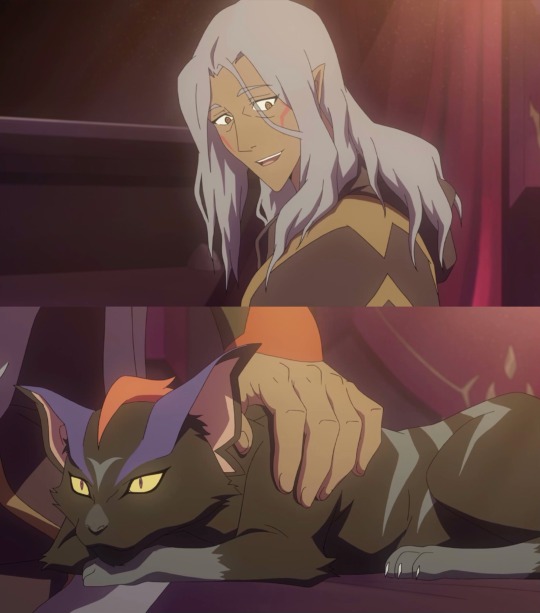
When Honerva falls ill and starts having what seem to be withdrawal symptoms, she demands to go into the rift to get quintessence, because “we must have it” / [we must] “get back into the rift”. The deduction I made was that the entity was actually the one speaking, because - other than the entity - nobody had ever been into the rift before, so “going back” into the rift is something that only the entity could have asked for. Logically, that means Honerva was possessed/infected with the entity.
—————————————————
And this turns our attention to… baby Lotor:
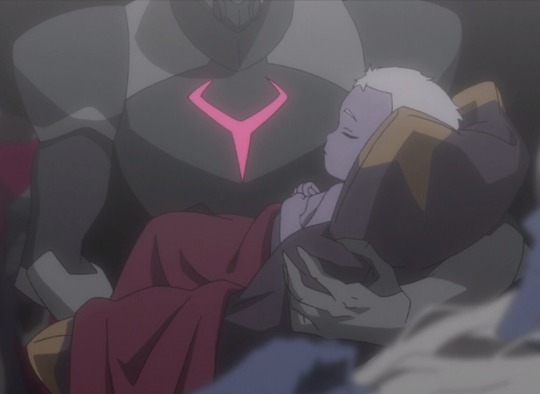
S8E2 “Shadows”: “Sire, the birth was difficult, but successful. Your son is healthy and in good shape, though we seem to be getting some strange readings coming from him directly. Similar to those that, well… Similar to those of the empress and… yourself.”
And voila, I think that makes quite a strong argument that Lotor was born with the entity, which gives him a unique position among other characters. In the same scene, the doctor talks about Honerva’s state: “She only seems to become aware when we administer her quintessence. I’m hopeful her condition will improve with time, but… Sire, we’re gonna have to face the fact that our quintessence supplies are finite. The empire cannot continue to run on what we have. And you, and the Empress, without it… you’ll—”
I’m circling back to Kova, which was also revived only after administering him quintessence, and now it’s clear that these “space vampires” cannot survive without the Q life juice.
Which leads me to an interesting question: did Lotor also need quintessence to survive? The answer seems to lead to a no. For the extended period of time when he stayed in Allura’s castle, either as a prisoner or working together with the Paladins, he did not show any signs of… quintessence withdrawal. As the EPs described him, quintessence is part of his DNA. Without divulging anything about the entity, since this interview took place right after S5, here’s their description (Source: AfterBuzz TV S5 interview - link in comments, since external links here seem to affect the visibility of the post):
JDS: It’s pretty safe to say that Lotor’s got that Daywalker kind of thing going on.
Interviewer: Little Vampire.
LM: Being in…in her womb, as [Honerva] was being exposed to all of this quintessence - it’s part of his DNA. It almost puts him on a level with Allura, pretty much how her quintessence is a part of her DNA. So it’s interesting to see.
Armed with this information, let’s move through the buildup of events that show us Lotor’s backstory, before we see him for the first time in Season 3.
In S8E2, which I’ll quote for a while, because it holds the bulk of Lotor’s early years, we first see baby Lotor right after his birth, rejected by Honerva. Similarly, Zarkon’s paternal instincts are almost abolished. He abruptly orders the doctor: “Take him away.”
The complete lack of empathy for the little nugget gives us just a hint into what this child will go through as he grows up.
——————————————
The next time we meet him, he’s an adorable, tiny school boy, whose stature is below Galra lineage expectations, but as a counterbalance, Dayak points out his remarkable skills and intelligence: he completed the Agotian trials successfully, even though they were advanced for his age. Also, his tactical scores are they highest they’ve ever measured. (Tactical scores, hehe. We know he’s going to become a good tactician later in life; it’s his natural inclination, clearly.)
As Dayak proudly finishes the short account of her pupil, little Lotor speaks up: “All I do, I do in the name of Galra.” I found this little statement quite significant, especially in the context of his education. It comes to show how deep the Galra values are ingrained in his character. It is his pledge of allegiance, something that he must have repeated over and over along his school years. Repetitio est mater studiorum.
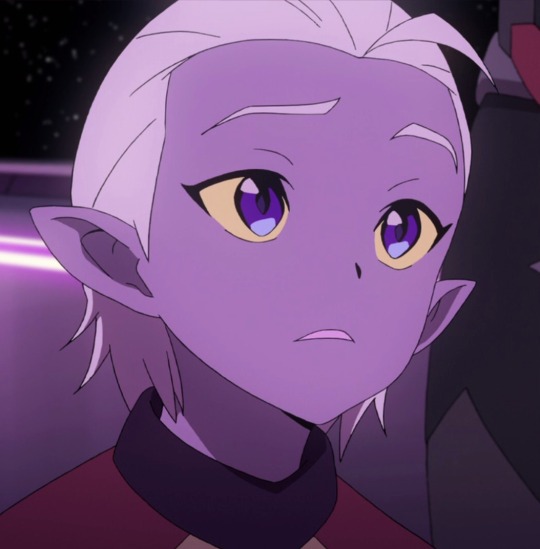
It’s absolutely heartbreaking to see the innocent boy with big, amethyst eyes and a burning desire to connect to his family be coldly dismissed by his own father - an expressionless, emotionless parent who wants to remove his “impurities”, simply because the little boy desires to know more about his mixed race genealogy and he dares to “speak out of his place”. The dynamic between father and son is revelatory not only for the brutality with which the little boy is treated by his own family, but, in contrast, we also get to see the enthusiasm and positive energy exuding from little Lotor, who, despite his father’s lack of empathy and mercy, still holds hope that he can somehow reason with him.
Dayak’s last reply to Zarkon feels painful on many levels: “He will be punished accordingly. We will sear him down to his inner fire so that he may burn the universe.” Whether she wants it or not, Dayak’s crop must inflict pain, lest she loses her job and probably her life.
Let’s shortly bring into focus the apparently hilarious moments between Dayak and Hunk.
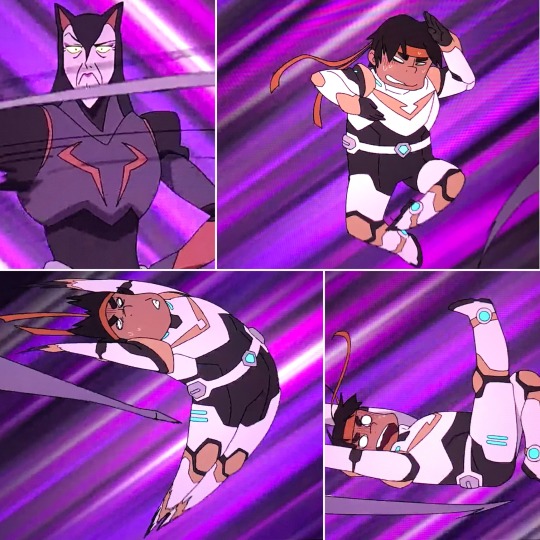
The training is about pain, and what pain teaches an individual. “For the mind to learn, the body must be broken.” Palen-bol, meaning “the enlightening pain”, is the Galran way of learning. “The Galra believe combat is the searing light that burns imperfections of every level, from personal to societal.”
Now, imagine Lotor going through the “enlightening pain”, day by day, year after year, palen-bol after palen-bol. My smile upon seeing Hunk’s comedy soon fades away into a desolate expression. What Hunk basically learns is to contort himself into various unnatural poses, to avoid the painful whips of Dayak. When he finally gets it, she congratulates him: “very good”. In order to avoid the searing pain, he must find creative solutions out, solutions that are not always straight paths. Like a tree that grows distorted shapes in a hostile environment, so does one who lives in constant fear and pain.

TEEN LOTOR
The next significant moment in Lotor’s evolution is somewhere during his early teenage years.
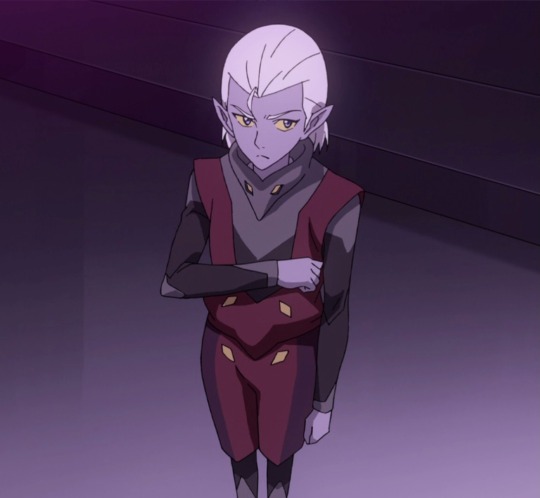
Pay attention to certain verbal repetitions, as Lotor borrows from his father’s language. Also, the Kova scene leads to some interesting conclusions. I’m quoting the entire scene, for better understanding.
Officer: “Sire, your audience is requested in the Kandar wing.”
Lotor: “Father, may I accompany you?”
Zarkon: “You will stay here.”
Lotor: “But I want to join you. I have learned much of our—”
Zarkon: “You are an insolent boy. You may be the prince, but I am your emperor.”
Lotor silently yields, saluting solemnly, but casting a contemptuous look in his wake. After Zarkon has cleared the room, Lotor refocuses on Kova and instantly cheers up. As the boy is leaning over to pet the cat, Haggar suddenly speaks:
“Do not touch him. He will hurt you.”
With a sneer, the boy ignores her. After petting the cat, he asks: “What is his name?”
Haggar: “He has no name.”
Lotor: “Then I shall name it. Your name will be…”
Haggar: “Kova. His name is Kova.”
Lotor, giggling, watching Kova climb over his shoulders: “This creature pleases me. It will be mine.”
Haggar, attempting to protest: “My lord…”
Lotor: “You may be the high priestess, but I am your prince, and you will do as I say. Isn’t that right, Kova?”
Haggar acquiesces: “Yes, my lord.”
So, although years have passed since the scene with Dayak, Lotor is still speaking “out of his place”, which earns him the title of an “insolent boy”.
Despite (most likely) repeated physical punishments along the years, notice how his enthusiasm for life and learning new things is still there, brightly sparkling in his eyes, as he offers to go with his father at important meetings. He is jovial towards his father, as if expecting him to - one day - reciprocate that cordiality, perhaps? This little soul harbors a lot of love and forgiveness, that is for sure!
Despite Zarkon’s stony-hearted reaction towards him, he pouts only as an immediate reflex, but then he cheers himself up by petting Kova.
His impish pout and little frown behind his father’s back foreshadow a future scene - when Zarkon will return to the throne, sending Lotor away. A more refined smirk will cross his face as he’ll depart, hiding behind it a more complex scheme than a teenager’s little mischief, but that scene shall be discussed further when I’ll get to it.
This little detail in child-Lotor’s life is an interesting inflection point that shows us how he learns to conceal his inner thoughts and his ploys from Zarkon, and by extension, from the world (remember the comparison with a distorted tree?). We know that adult Lotor is a master at scheming behind people’s back, working from the shadows, hiding himself - something that even Haggar reproaches him: “You say you rule, yet you stay hidden.” It’s something that he learned over and over again as a kid.
“You may be the high priestess, but I am your prince…” Didn’t Zarkon just utter the same thing? “You may be a prince, but I am your emperor…” Little Lotor learns very fast, his mind is a sponge absorbing everything from his father. With this you can pretty much tell how in awe he still is with him, imitating his vocabulary and trying to emulate his demeanor. The attitude is there: he’s proud of what he’s learned so far, he’s self-confident, and begins to have leadership traits: “you will do as I say.” All he does, he does in the name of Galra…
As for the interaction with Kova, here’s how I see it:
When Haggar says, “Do not touch him. He will hurt you,” I believe the meaning is more than just “Kova will scratch you.” Since Kova and Haggar both are infected with the entity, what are the chances that Kova might possess the same potential of sucking out the life of other living beings?
So in this context, I think that witch Haggar presumes that the prince might get injured. She’s unaware that Kova will not cause him any harm, because… what do you know? Lotor also has a little entity; he was born with it. And Haggar has no clue.
The bond they will form for the next ten thousand years perhaps goes deeper than we think. We know from S8 that Haggar was able to get into the minds of her Altean followers, because she infected them with the entity. There is a telepathic communication that forms, and maybe Lotor and Kova form a similar… mental bond? I’m inclined to believe this theory for several reasons: 1) in S8, Honerva is able to find out Lotor’s location only after probing into Kova’s mind. 2) Narti was also mentally bonded with Kova, and she could see through the cat’s eyes (which stirs the question: did Narti have the entity as well?)
Deep breath.
Are you ready for one of the hardest scenes in VLD?
YOUNG ADULT LOTOR
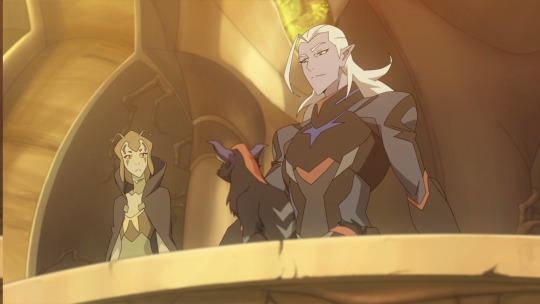
“Are you nervous?” asks Ven’tar.
Lotor replies with a confident, affected voice, looking up and proudly surveying the grand plaza, filled with thousands of people cheering him. “No, Ven’tar. This is my chance to finally make a difference. To show my father what we are capable of.”
Besides the fact that he nonchalantly displays his cat at the edge of his balcony, for the masses to see, notice the expression on his face, his eyebrows. He is pleased with himself, proud of his achievements, proud of the people in front of him.
What he says is also very significant, because it comes to show that Lotor, despite a lifetime of abuse and trauma from his father (and neglect from his mother), still believes there is good in him. He wants to “show” him what he’s capable of.
Oof. The need for validation. Why do people seek validation from others (especially from their family)? You guessed it: mainly because during their childhood, they did not receive enough praise or encouragement.
Overachievers are, oftentimes, love-seeking people who try to compensate for the lack of approval by trying to reach even higher goals, in the hopes of getting the love they need. In that note, here’s what Lotor tells his father:
“Our quintessence yields are some of the highest in the empire, and we’ve been more efficient than any other. By working alongside the denizens of this planet, like Ven’tar here, we’ve outsourced—”
“We’ve outpaced even the most generous projections.”
Poor Lotor!
The most horrific introduction into adulthood is about to drop. The hopeful, optimistic, love-seeking prince will see the true face of his father, and it is not a beautiful one.
We don’t know the details of Lotor’s relationship with Ven’tar, but from the fact that she addresses him without any royal titles, we can infer that they are at least friends. He loves the people of this planet, and he enjoys having her around him, so much so that he actually brings her with him to his father. Meet the parents?
Tragically, his father is utterly offended by Lotor’s introduction to such friends. “You dare work with this pitiful race as if they are your equals? […] The heir to the Galra throne should not sully our honor by working with his subjects!”
Yet Lotor has not learned his lesson yet. He raises his voice at him, like an outraged child that believes there is a way to reason with Zarkon.
Transactional Analysis psychology at its best, this scene provides us with a “game” between the critical, persecuting Parent ego and the rebellious Child ego. Enraged that things are not going his way, but hoping there is still a chance to shake his father from his insensitive state, Lotor takes it up a notch (in a game of “I’ll show him, he’ll see!”):
“It is the way my mother’s people would have done things.”
Lotor knows exactly how sensitive this subject is. All his childhood, he has been banned from researching anything about Honerva. Yet here he is, openly and rebelliously admitting it:
“You thought I couldn’t find out about my own mother? About her people? You thought you destroyed every remnant of Altea, but you cannot unless you destroy your own son as well!”
Lotor is now playing a very dangerous game. What he still does not realize is that his father’s reason is gone, his madness is pushed all the way to the dark side of the spectrum. He bargains with his own life, betting that Zarkon won’t harm him or his subjects. What’s worse, he unwittingly bets an entire planet against his self-assured comments (“unless you destroy your own son as well”). Actually, Zarkon will destroy him too, alongside Ven’tar’s planet. Not physically, but psychologically, he sure does.
“Enough!” Zarkon roars back at him.
Yes, enough, because it’s unbearable for Zarkon to even go there. The madness that clouds his mind has abolished any rational Adult from the picture. There is only the Tyrant, and he’s made up his mind.
“You are to crush this planet beneath your heel!”
The rebel child fights back: “Never!!”
Zarkon’s answer completely takes Lotor aback: “Then I will!”
Lotor is still in denial. The most cruel, dark, ugly face of his father is finally revealed to him and he cannot fathom it out. His father is truly capable of the most abominable acts.
Incredulity and desperation drips from his lips: “You wouldn’t. You can’t! Father, wait!”
Father, wait… Maybe, maybe he can fix this… Maybe he can soften his heart with one last plea, maybe he can twist himself one more time to his father’s will, if only he could to save his beloved planet:
“No, please do not do this, Father. Do not make these people suffer for my actions.”
The rebellious child shrinks into a penitent little being who bends to his abusive parent. How can he save them, now, in the last moment?
Alas… “It is already done.”
“I will do as you ask. The people will serve the Galra.” He will bend, he will bow to his father’s will, he will endure once more the whipping and palen-bols, he would do anything to save them! (Isn’t just this scene enough to reveal Lotor’s true character?) Utterly desperate, he runs after him, begging.
But we all know how it all went down...
Waking up to face the image of utter destruction, the fire outside reflects the scorching pain and horror inside him.
“You are hereby banished from the empire. Forced to live out the remainder of your days remembering your failure here.”
Indeed he will remember it for his entire life. After thousands of years, it will be his first and only confession to Allura, spoken, of all places, at Oriande, the most beautiful, celestial site in the universe.
“Have you nothing to say, witch? Surely even you can see the folly of your master’s actions,” utters Lotor through gnashing teeth, back at Haggar, who watches him impassively.
After a tragedy of this magnitude, I’m quite sure many would lose their mind. How did Lotor find the strength to go on after this? How did he preserve his sanity? Or maybe he actually… didn’t?
—————————————
We know a little bit about Lotor’s life in between this event and the first time we actually meet him, in S3E1, in the gladiator arena. From what he told Allura, after the harrowing event on Ven’tar’s planet, he spent the next few centuries searching for clues about his Altean heritage. We also assume it was within that time frame when he gathered the Alteans scattered across the corners of the empire, and brought them to the hidden colony in the Quantum Abyss.
But why his Altean heritage, you ask? He could have simply tried to find his inner peace in other ways… like, I don’t know, let’s say meditating, getting mental treatment, finding an occupation that would give him a different purpose. No, he spent centuries diving into the lost history of Altea, “another culture destroyed by Zarkon.” This was the only occupation that could give meaning and purpose to his life.
Why Altea?
Because it was the culture of his mother, whom he idolized. So much so that he defied his father’s interdictions and followed the Altean customs when ruling Ven’tar’s planet. So much so that when Allura dares to suggest that Haggar might be his mother, he snaps at her.
A child rejected by his father, mistreated, beaten, abused, tries to find refuge and comfort at the bosom of his… mother.
After Zarkon destroyed his heart, Lotor ran straight into the arms of Mother Altea. I believe that as much as the lost Alteans needed him to provide them a safe refuge, he needed them even more. He needed them as a child would need a mother to turn to, a safe place where he could heal his wounds.
I think herein lies the key to understanding Lotor’s mental trajectory and giving a true meaning to his mental breakdown and to the words he utters during the S6 tragic events, as I’ll discuss when we’ll arrive there.
Take a few deep breaths. Stretch your legs.
ADULT LOTOR BEFORE ALLYING WITH VOLTRON
Let’s see what he’s up to, thousands of years after all is said and done, during the new Paladins’ era. Haggar summons him to return as pro tem, and we first meet him in the gladiator arena.
We learn a bit about him from the little gossip murmured between Throk and his crony, watching the show. The “exiled brat”, how they call him, likes to “fight alongside his enlisted men, like a lowly private.”
“Worse than that, his top generals aren’t even pure Galra. They’re half-breeds at best. He has no honor,” Throk continues.
“Some say he allows the planets he conquers to continue to rule themselves. Can you imagine?”
“Clearly he’s a dangerous lunatic.”
This is the general atmosphere in which Lotor enters as emperor pro-tem, but now we know what kind of “lunatic” we are meeting.
His combat skills show his great talent for evasive maneuvers, using the opponent’s size to his advantage. He has adapted perfectly to the hostile environment in which he grew up. Like Hunk learned to avoid Dayak’s stinging crop, Lotor masters the art of evasive maneuvers to the tiniest detail. He easily defeats the big guy, then, with a theatrical gesture, reveals Throk’s hidden agenda to the public (courtesy of Ezor spying around - so we also know he’s got some good tactics to stay ahead of the game).

During his fight with Throk, Lotor makes some interesting remarks:
“You have flawless technique, that I’ll grant you. Still, you must realize at some point, that your repetitive attacks are getting you nowhere.”
“Your tactics are stale. And in the end, your own aggression is your undoing.”
The easy win that Throk provides, along with the dramatic effect it has for the audience, gives Lotor the perfect opportunity to win the public’s heart, by sparing Throk’s life. A novel approach.
“My father built our Empire on the bones of his enemies. But the time has come to change the old ways, and inspire not fear from those we rule, but loyalty. We must not waste our energy fighting to keep our subjects down, but rather multiply it, by allowing those worthy to rise and join our ranks. The Universe can no longer doubt our strength. Each ally gained only makes us stronger, while those who continue to stand against us… will be crushed.”
Wise words of a visionary man with a progressive agenda, he seeks to dislodge the old ways of the regime.
“The masses are easily manipulated,” he tells his generals as he returns victorious. “Have Throk transferred out to the Ulippa system immediately. Let him rot with the ice worms,” he beams a wicked smile.
So where’s the “each ally gained makes us stronger” promise?
Well, Lotor is intelligent enough to weigh the quality of his so-called “allies”. Would Throk really be someone “worthy to rise and join his ranks”, after he just plotted against him? There is a Latin proverb - “viperam sub ala nutricare”, or “to nurse a viper under your wing” - a caveat that you may not want to keep vipers too close to you. And Lotor’s survival instinct keeps him far away from such vipers. Actually, he is constantly on the watch for vipers - a trait that I shall repeatedly point out, because it reveals his paranoid tendencies, born of his turbulent and traumatic past.
From this episode we learn that he is a calculated man, who sends spies ahead of him to assess the territory, who knows how to win the public’s heart through inspiring speeches and amazing warrior skills, and who has a keen eye for discerning friends from foes. Bottomline: a very guarded man. Does he seem duplicitous and a bit suspicious? He sure does, but does he really hide evil intents? As a first-time watcher of the show, that would be the instinct. But reading the story backwards - meaning, starting in the true chronological order, from his childhood - we begin to comprehend the true reasons behind his exploits.
——————————————-
The following episodes reveal his brilliant tactics (of course, he practiced since he was a kid):
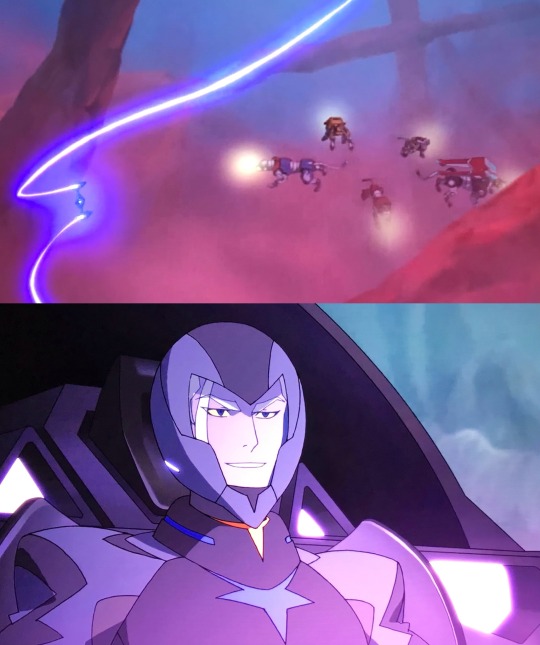
He easily lures the Paladins into multiple traps (Planet Puig, Thayserix), manipulating the battles in order to learn more about his opponents, all while enjoying himself. Not even looking to take them down, he simply wants to test their aptitudes and capture them if possible.
Ignoring his more impetuous generals, he knows when to retreat. “A leader must know when to leave the field of battle.” Something that Keith, as the new leader of Voltron, learns just now, for the first time. In many ways, the Paladins are learning new things via Lotor, and they’ll continue to learn from him throughout the seasons. As the EP’s also mentioned in multiple interviews, at their core, Lotor’s intentions are good, but his methods are not always as clean as Voltron may desire. He is operating not only from how he was raised, but also from the experience of his traumas, and we are given plenty of examples throughout the following seasons.
Lotor learns form every occasion, turning it to his advantage. The fact that the Lions can still form Voltron is “an opportunity”, which he fully wields, in S3E4 “Hole in the Sky”. Another trap for the Paladins, he effectively uses them to ‘pull his chestnuts out of the fire’. As he states, “If Voltron disappears from our world, then we win. If they make it out with the comet, we’ll take it from them. It’s a win either way.” Put that against his more tame clarification given to the Paladins, and you can see why it’s really a gray area where this man actually operates: “I’m afraid I had to be a bit duplicitous in effecting its retrieval. […] It was a calculated risk, I admit that. But I knew they’d come through without a scratch.” The high purpose he pursues (entering the rift) is worth the risks and the prices he’s willing to pay.
—————————————
In S3E5 “The Journey”, we learn something extremely valuable about him - how he has trained himself to be on constant alert about spies (remember the vipers mentioned earlier?). Swiftly apprehending general Raht, Haggar’s assigned secret agent, he decides to pay the witch a visit and confront her directly.
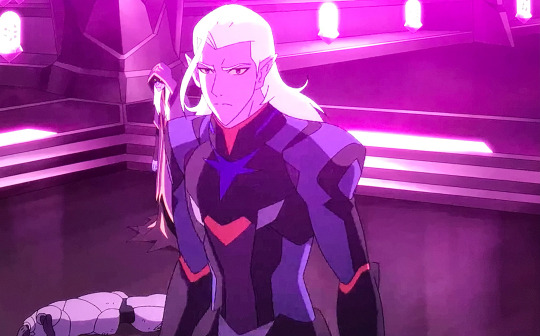
Haggar makes no gesture to deny the allegations, rather twisting the knife in his wound: “I know many ideas float through your head, just like your father, but the Galra Empire needs your leadership in these troubling times.” It almost resembles a domestic scene (I honestly chuckled), as if without realizing it, Haggar talks to him like a mother scolding her child. I find his reply equally entertaining (yet tragic), even his expression taking after that of a child desperately trying to rebel against his family: “I am the leader, but I am not my father!” It won’t be the first time when Haggar reproaches him that he’s not getting involved in imperial matters, only hiding in the shadows. That is his modus operandi - and we’re just beginning to understand why.
————————————————-
The next episode, “Tailing a Comet” holds some keys about what Lotor is up to, but also carries some mysteries which have not been unlocked to this day. We learn that he already used some of the comet ore to manufacture a ship, but we also learn that he attacks a Galra base, in order to retrieve a teludav lens. Again, he’s operating from the shadows. As Pidge rightfully points out… “I thought Lotor took over for Zarkon. Why is he attacking a Galra base?” Because - Haggar, that’s why. We know she’s tailing him constantly and she is the last person in the universe that he’d team up with. In fact, if I get to think of it, Haggar stalking Lotor is the underlying thread of the entire show.
But what of the teludav lens? Clearly, a link must exist between that and the fact that Acxa was sent to retrieve scaultrite from the belly of the weblum, where Keith found her in the first place. Allura rightfully infers that an Altean must be employed to operate it, but she guesses Haggar wrong. Yes, Haggar is Altean, as Allura discovered in direct combat with her, but it’s clear that Lotor does not want anything to do with the witch.
That leaves us with only one alternative: someone in his hidden Altean colony. (Lotor himself seems to not possess Altean alchemy powers to operate a teludav, at least none that we’ve seen). This loose thread has never been elucidated. To spread even more mystery around Lotor’s aura, even his generals have no clue about the true purpose of all these shenanigans. As Shiro says, “something strange is going on here, and we need to figure it out.” Um, actually, we never fully figured it out, courtesy of the garfle-warfled S8.
I found an interesting parallel, and again, a lesson that Keith indirectly learns from his interaction with Lotor: the advice that Shiro gives Keith at the end of this episode: “You need to pick your battles. Sometimes you have to make hard choices.” Similarly, every choice that Lotor makes throughout his life is a battle he has to pick - behind Haggar’s back, as we learn right at the end of this episode, when the witch attempts to pry relevant memories about the teludav theft out of Throk’s mind, while Lotor eavesdrops, behind the corner.
——————————————-
In S4E3 “Black Site” we get a multitude of new details about Lotor’s relationship with his family. When he is called to the imperial court to have his pro tem title dissolved, the first person he encounters as the doors hiss open is Haggar. For a very short moment, Lotor looks startled, and he casts a glance at the witch. Premonition?
As Lotor relinquishes imperial reigns back to his father, the interaction gives a quite fascinating subject of analysis. Lotor is no longer the naive youngling; he has completely abandoned the sincere vocabulary, instead glib words rolling off his tongue. He knows very well that Zarkon and him are never going to see eye to eye, but he did not come there to seek a fight. He’s not (yet) powerful enough to take him down, so the smooth-tongued approach has to be the way. He theatrically attempts an ingratiating offer to stay by Zarkon’s side and “learn” from him, knowing full-well that it will never happen. As expected, Zarkon dismisses him disdainfully.
And here’s the smirk I was talking about earlier:

It’s a rehearsed attitude, it’s the grown-up Lotor, like the tree grown under harsh weather, the prince whose childhood innocence and optimism have been replaced by a cynical, calculated demeanor, carrying out ploys behind his father’s back because the front door was closed a long time ago.
What a confident smirk.
He worked for so long on this plan.
He’s getting closer and closer to achieving his dream. He snatched the comet ore and he’s making his own Voltron. Soon he will be able to enter the rift and get as much quintessence as he needs, for his grand plans.
Unfortunately, his confidence becomes his blindspot, as Haggar taps into the mind connection with Kova.
The sad irony is that he thinks he has Haggar all sorted out, when, upon his departure, he runs a thorough scan of his ship for trackers. The scene screams “paranoia”, except this paranoia is indubitably justified. When you’ve been stalked for millennia by a family who seeks to destroy you, all your senses are sharpened, survival instinct ready to spring in action at any second, adrenalin ready to kick in.
Killing Narti, a huge blow for the team, does not ensue as a mindless knee-jerk reaction. It is a hard choice he makes, for their own survival. He learned throughout his life to decide on the run, and you can see it on his face that he takes no pleasure in killing. Narti falls victim, just like he later admits that he had to sacrifice a few Alteans to preserve the future for millions.
We do not know the circumstances in which he had to sacrifice “the few”, but if they resemble in any way the tough spot he found himself when slaying Narti, we begin to see the trail of tragedies that haunt his life.
—————————————
In S4, Ep3&5 we witness the growing mistrust of the generals towards Lotor. Ezor tells Acxa: “What about Narti? She trusted him. You saw where that got her.”
Notice that Lotor didn’t share some essential knowledge with his generals. The reason why he slayed Narti was because of the connection with Haggar via the entity inside Kova.
I believe none of the generals (except maybe Narti?) knows about the entity, his Quantum Abyss colony and his secret team building the inter-reality gate, based on their behavior along the show. Yes, Acxa might have a stronger loyalty, switching back to siding with him just from a few glance exchanges, but eventually she also renounces him.
In S8E5 “The Grudge”, Acxa explains to her friends in the gym room that “…we had to abandon the animal [Kova] on our destroyed ship so we could escape without being tracked.” This simply implies that she knew about Haggar controlling the cat, but not exactly how she controls the cat.
The rift gate scene also proves that Lotor runs secret operations that he obscures even from his generals (NB: when he deems appropriate, he discloses them). This is his dynamic way of existence: juggling with secrets among people who put their trust in him, in order to protect himself and those dear to him from his corrupt family. The trauma that he endures for millennia force him into wearing these many masks.
After his attempt to enter the rift between realities fails, his generals betray him. Most likely not the first time when people double-crossed him. The difference is that stakes are getting higher and higher, now that he has his own comet ore ships, and will continue to get higher as he’ll discover Oriande, all the more reasons for him to be extremely cautious.
But he’s used to traitors. As a matter of fact, when he wakes up, he says, with a bitter expression, “You plan to give me up. I understand, Zethrid. You do what you must, and I’ll do what I must.” This scene also foreshadows the larger breach of trust, between him and the Voltron team in S6.
Is he justified in keeping secrets from his team? Hell yes. The risk of losing Altea is so great that he has to.
—————————————
When Lotor flies too close to the sun (literally), his comet ore ship proves to be more resilient than Zarkon’s cruisers. As he dives deeper into the plasma, his expression - of desperate survival, of hate against his assailants - borders madness, resembling his turn in S6

Trauma and disintegration of his social connections, two major factors in describing a madness arc, converge right in this chapter.
If trauma from the past is not enough, being hunted by his own father is another straw atop the camel’s back. Not the last one, though. Not yet. More potent factors need to converge, to throw him off the cliff, as we’ll see.
By witnessing him completely alone, we also get a glimpse into his true character.
The moment he learns about the imminent explosion of the Naxzela planet, Lotor heads right into the heart of danger. Why would someone who, all this life, fought for his own survival, fly directly into the range of a galactic ticking bomb?
Because this is how we learn who he truly is. Alone, no external influence or circumstance, no pretend smiles or smirks behind one’s back, he takes decisions based on his true moral compass. If he were the monster the story would seemingly lead us to believe in S6 and beyond, he’d run to cover his own skin. Instead, the worry across his expression reveals just that: genuine concern.

The same genuine concern sits atop his brows as he enters the battle scene, effectively disabling Haggar’s weapon. Finally, after a long string of tragic mishaps, he secures a win. A win which he wittily and swiftly takes advantage of: “Attention, Paladins of Voltron and rebel fighters, I know we’ve had our differences in the past, but… I think it is time we had a discussion.”
BECOMING VOLTRON’S FRIEND
With S5 come Lotor’s brightest and most glorious moments, and along with them, the complexity of his character further augments.
Before I begin, I can’t help posting a side-by-side Loki-Lotor screencap, because Lotor’s prison cell screams the same design concept and I love it, for many reasons.

Also, let’s not forget this sassy first portrait of Lotor as he begins his adventure alongside the Paladins:
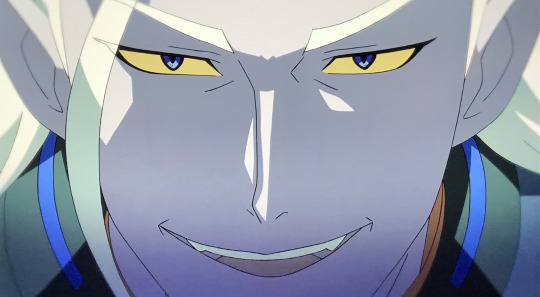
His discussions with Allura and the Paladins while serving prison time in the castle provide us with new details about him, but also lead the viewer into a skewed picture of the events.
#LotorWasFramed, shared by many on social media at the time of S6 and beyond, including by some of the VLD cast members, hints precisely at this skewed view of Lotor:
Allura says to her friends, in S5E1 “The Prisoner”, “I’m still not comfortable with this. It just doesn’t feel right.”
Later in the episode, she reiterates, “I can’t stop thinking that we might be an unwitting part of a much larger ulterior motive.”
Yes, her intuition is right, there is a much larger ulterior motive, but what is the ulterior motive? Is it truly an evil plot?
Well, take Allura’s final words about Lotor, in S8E13 and there you have it, canon-compliant: “Lotor may have been misguided, but ultimately, he wanted to preserve life. Honor your son...”
Highly frowned upon by fans as a meager redemption, truly lacking the complexity that should have reflected the richness of his character, it is, nevertheless, an exoneration, stating in clear that his ultimate goal was to preserve life - and to be more precise, Altean life, the Altean colony. We have to honor his work, because, ultimately, even though his methods didn’t feel right to Allura, even if his methods obscured ulterior motives, those motives were righteous. And Allura’s final statement is canon - one cannot deny that. The end justified the means - it truly fits into how he operated, and we can see why he had to operate that way - not only because he didn’t know of another method, but because the social and political circumstances forced him to.
So, armed with this information, we begin to see how his “ulterior motive” is plotted. He reveals to the Voltron team that his goal is to enter the rift to get quintessence, to flood the empire with a fuel currently deemed a luxury, to effectively “drop the price of oil”. A paradigm shift, a new dawn for the old empire. No more need for blood in order to obtain quintessence. A peaceful era for everyone. And he doesn’t lie. This is his intention. But not a complete picture of it.
What he doesn’t reveal is his precious Altean colony, the one that he hopes to finally be able to release from hiding, once peace has been established within the empire. In a future dialogue, he will state precisely that: “I’ve dedicated my life to preserving Altean culture. Now that we’ve unlocked the quintessence field, all of your people, who would have been hunted long ago, had it not been for my intervention, can live in peace.” Can we blame him for not revealing this to the team? Absolutely not. Knowing that Haggar can plant spies in the most inconspicuous locations, Lotor is constantly on the watch, protecting at all cost what is dearest to him - Mother Altea. And wasn’t he right? There was a mole in the Voltron team: Shiro’s clone.
————————————-
Returning to the scenes with imprisoned Lotor, let’s tap into some subtle psychological hints at his traumatic past.
When Allura calls him “the leader of the most bloodthirsty race of murderers this universe has ever known,” his reply does not arrive in anger, but with a surprisingly calm and pacifying tone, as he continues to sit down: “Can people not change? Is it so hard to believe that I wish to return the Galra empire to a bygone era of peace?” This is not the first time his mixed lineage has been the subject of spiteful remarks. For ten thousand years, he must have constantly heard the “half-breed” denigratory comments. Why would an Altean comment about his Galran blood strike him differently? He surely has grown thick skin by now.
But if these words don’t pierce the thick skin, this comment surely does: “Sounds like you are your father’s son,” says Allura with enmity, after he explains that his sole purpose has been to enter the rift.
This. This hurts. His weak spot. To have him compared with the tyrant who terrorized him for his entire life, what a blasphemy! He snapped at Haggar when she dared utter such words, and he snaps again now.
He stands up, aggravation in his expression, tone raised at Allura, attacking her with a similar family comparison: “It was your father who led the scientific exploration that discovered quintessence. An exploration, I might add, that resulted in the creation of Voltron. This isn’t a zero-sum game. Meeting the needs of the Galra empire means bringing peace to the universe. That is the future enlightenment brings us, one of prosperity for all. […] All I ask is to be judged by my actions, rather than your preconceptions of my race. If that is beyond you, then perhaps you should just finish me and get it over with. Clearly, Princess, you are not ready to end this war.”
This is obviously a subject of deep pain for him, and we don’t need any clarification as to why.
How painful?
World-shattering painful.
Maddeningly hurtful.
At this point Allura is someone he just met. He takes it personally when she compares him with Zarkon. What will happen when he’ll fall in love with her and then she’ll… revisit the same comparison?
Let’s refocus on his conversations with Allura and the Paladins:
Notice how skilled he is in dodging their questions regarding his ploys.
He admits to being “a bit duplicitous”, framing it as a means to a higher purpose - which is not a lie.
He’s not afraid to defend his political beliefs, and even fight back, ending his speech with a comment that emphasizes the maturity of his agenda, while pointing out her inexperience: “Clearly, Princess, you are not ready to end this war.” He does have a ten thousand year advantage over her, that’s a fact. (I also found it quite amusing that the very next scene depicts Allura being nervous about her lines when addressing the Coalition, while Lance advises her to… jot notes down on her palm, because… he does it all the time. Talk about inexperience!)
————————————
While the plot revolving around saving Commander Holt still holds a degree of uncertainty whether Lotor and Acxa were working together, it does seem plausible that Acxa acted in line with his interests, offering Holt to Zarkon, so that Lotor could have his one-on-one battle with his father.
Lotor attempting to convince the Paladins not to hand him over to Zarkon shows once more his tactical skills. He plants the idea of a “royal alliance” into Allura’s head (to Lance’s vocal dismay), and, perhaps due to his attraction to her, or simply as an intent to charm her, he goes as far as saying “You and I”. There is clearly chemistry between them from the start, and it’s savory to watch it unfold. Even as enemies, Allura watches him speak with mesmerized attention, absorbing his every word, and I believe it does not go unnoticed by him, which explains why he brings his focus on the unity aspect, stroking her ego with comments about their parents’ glorious past. His speech is so convincing that Allura already ponders on the “royal alliance” possibility.
The fight between Zarkon and his son is another source of precious details about Lotor. Now is the time for Lotor to speak his mind. When Zarkon calls him “weak” and “darkest shame”, Lotor doesn’t flinch. He’s grown thick skin for such insults. No longer the helpless child, Lotor sees the corrupt Zarkon exactly for who he is, and in this final moment between them, he points out all his weaknesses, especially his obsession for getting back the Black Lion.
The fight, spectacular (and magnificently rendered through animation), displays Lotor’s talent in evading direct blows and his keen eye for his opponent’s weak spots.
I found it so significant that Lotor kills his father not with a bayard, not with a sword, but with a shard of metal lying around on the ground. His desperate yell - “No!” - seeing as Zarkon points his deadly weapon at the Lions, proves once more his genuine concern for the Paladins. He kills his father to protect his allies.
His immediate facial expression is not of joy, not of jubilation, but of deep grief. I’m reiterating this: he does not take pleasure in killing, even his worst enemies. A positive trait that seems to contradict his portrayal after S6, which ties back to the #LotorWasFramed point that I made earlier.
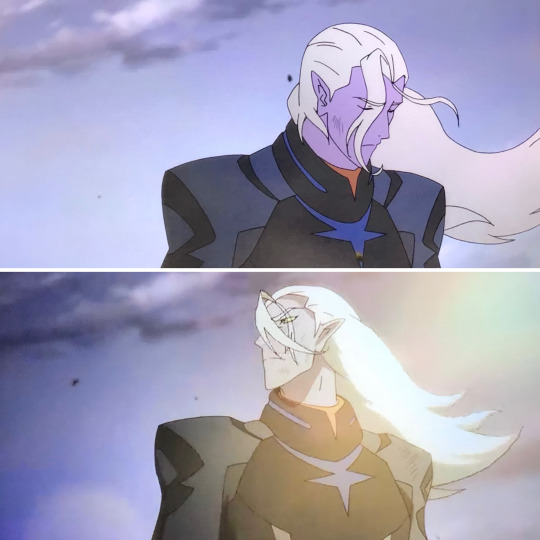
The symbolism of the post-battle imagery conveys the suffering on his expression. As the light, emblematic of the new era that is to come for Lotor, crosses his face, we see the traumatic burden of his past, a burden he carries forward. Even if he killed his own father, the act itself does not erase the multi-millennial painful past.
And we continue to see that trauma etched into his expression on many occasions, including this scene, in the “Postmortem” episode.
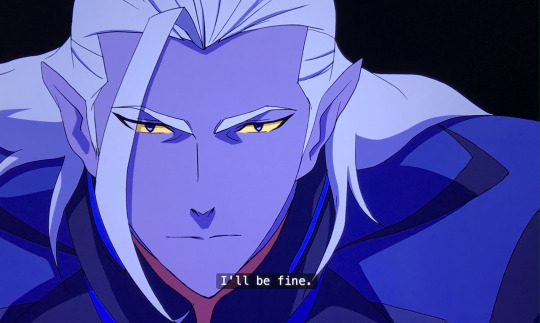
When Allura asks him, “Are you alright?” his dry answer reflects the emptiness inside him, “I’ll be fine.” Someone who wants to bury their pain would resort to similar affirmations. I’m fine. Or… Everything is fine. Or… I’ll be fine.
No, sir, you’re not fine, you won’t be fine until you address that deep level of trauma.
Instead, Lotor pushes forward, because his work is not done. In fact, he’s just beginning.
First, he must take the throne as legitimate emperor.
Then, all his attention will focus on finding a way to obtain quintessence from the rift.
And lastly, his dream of freeing Altea would come to life.
Only after that, he can, maybe, maybe, relax (does an emperor of such a vast and violent empire ever relax?).
—————————————
So let’s begin with Kral Zera. Firstly, Lotor has to convince the Paladins to fly him into the danger zone, and the only one who stands by his side is Shiro, whose tactical experience aligns with his. The tension that ensues among the Paladins makes Shiro walk out of the room, while Lotor casts a regretful look in his trail. He clearly doesn’t enjoy being a source of discord among the Paladins.
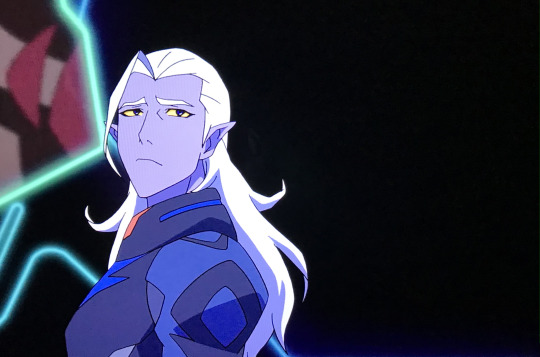
So here it is: his genuine desire for peace and amity. Which lines up with his statements about bringing peace to the empire. And we see it once more as he comments about the Galra forces fighting amongst each other at Kral Zera: “This is exactly what I wanted to avoid. I knew they would all turn on each other.”
This is the true Lotor, underneath the many layers and facades he wears around everyone.
But he is also the wily prince who sneaks out of the castle behind Allura’s back, along with Shiro and the Black Lion. Also, the way he spins the narrative in front of the Galra, boasting about returning the Black Lion to the empire? Genius.
When Haggar insults him about his Altean lineage, he dismisses her with a few words, but we can see the aggravation in his narrowing eyes. Drop by drop, all these upsets and tribulations add up to his already heavy mental anguish that he carried across the eons.
The clash between him and Sendak puts emphasis once more on his fearlessness and deft swordsmanship.
The lighting of the flame carries a solemn, uplifting, yet tragic air to it.
He ascends the battered, collapsing steps of the Kral Zera, perhaps the steps of his destiny, while explosions flare up the skies. He takes the throne of an empire in complete disarray. While he lights the flame, he harbors a stark, but also angry expression, because… why should he be joyful? He’s taking reign over a civilization that has perpetuated his traumas for so long.
———-
S5E5 “Bloodlines” provides a respite from all the anguish we’ve seen so far. He spends time with Allura, searching for Altean clues in Haggar’s lair, and we see the growing attraction between them bloom.
But watch for hints about his past traumas.
When Allura discovers that he is half-Altean, we get Lotor’s direct depiction of his status in the eyes of Galra, as well as his self-confidence in regards to his mixed genes: “It was something the Galra considered a weakness, but I considered it a strength.”
Also, his next words reveal his deep admiration for his mother. He venerates her, and he adores the Altean culture. As much as I want to emphasize the level of trauma that this man has gone through, I also want to bring under spotlight his awe for the mother he never knew, and by extension, of the entire Altean race. Pay attention: “The union between Zarkon and Honerva sparked a technological revolution within the empire. Even back then, Altean culture was remarkably advanced. The kinds of experiments she was conducting… she advanced science by eons.”
Something that always caught my eye was Honerva’s science log itself. Lotor scrolls through her research and we can clearly see the comet ore in one of them, a sphere in another and… the entity inside the tube in a third slider. It’s clearly the entity, compare it with the original image from S3E7:

The fact that Lotor casts a long look at the slides makes me think that he might be aware of the entity. Perhaps this science log will make him understand even more about it?
When Lotor makes a few comments, frowning while inspecting his mother’s science logs, we conclude a few aspects about him and his mother. “By the end of these logs, it’s like they’re written by a different person. She’s frantic, paranoid, erratic. Her reason and intellect are gone, replaced by fear and paranoia.”
This confirms exactly what happened to Honerva (and foreshadows what will happen to him as well). Due to her obsession for power and knowledge and enhanced by excessive quintessence demanded by the entity inside her, Honerva lost her reason, became… a different person. Does that not resonate with how Lotor underwent an apparent abrupt change in S6? The comparison might come across as superficial, but I promise I’ll go deeper when discussing the S6 scenes.
Also, this reveals a much deeper truth about Lotor. He is in denial about what happened to his mother. Pay attention to the scene where Allura suggests that Honerva might have turned into Haggar.
“That witch is not my mother!” snaps Lotor, taking Allura by surprise. Not only he raises his voice at the princess, but he instantly turns his back on her, leading to an awkward moment. I found this instance extremely telling. Suggesting to Lotor that his mother turned into a witch?? Unconceivable!
I’m reiterating this: he ADORES his mother, and he adores Altea. He wants to protect his mother’s image as much as he wants to protect his Altean colony, at all cost. Even if that means keeping the colony a secret from Allura - the princess of ancient Altea - who slowly conquers his heart. Was there a conflict inside him about this? I’m absolutely sure there was.
Another relevant aspect about Lotor is that he’s an Altean culture nerd. Especially the alchemy part. He’s been hunting high and low for Oriande, because his sharp intelligence guided him in the right direction. And with a bit of persistence, he guides Allura in the right direction, too. Together, they unlock the compass stone, and, despite the Paladins’ and Coran’s doubts, Lotor convinces them to “navigate by cave poetry”, eventually discovering Oriande.
—————————————
Lotor has Altean marks? The Marks of the Chosen, no less. I love the attention to the shape of the marks, too. Uncorrupted Alteans display half-moon marks, while Haggar’s look completely distorted, like scars dragging across her face. In between them is… Lotor. His marks are neither half-moons, nor disfigured shapes. Daywalker?
In any case, the fact that he is accepted in the realm of Oriande clearly means that he has potential for alchemic powers.
Even in the celestial beauty of such a place, his mind flies into dark corners, recalling the destruction of Ven’tar’s planet. This should tell you how deep his wounds go, and how desperately they need healing. With such unspeakable beauty around him, his miserable expression only underscores the level of internal trauma.
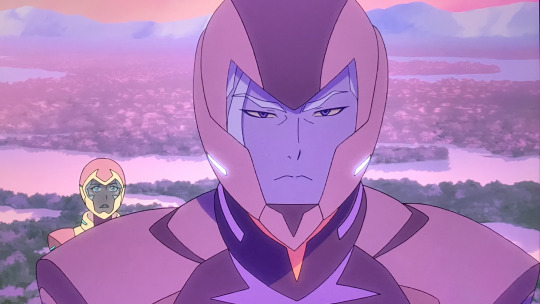
“You know, I envy you growing up with King Alfor. I always wanted to be an explorer and learn about the universe. My father was only interested in conquering it. He once put me in charge of a planet for a year, running the quintessence mining and getting to know the local population. Rather than employ the usual Galran methods of subjugation, I worked alongside the leadership of the planet, learning their customs. We would only extract as much quintessence as could be replenished. And I enjoyed my time there quite a bit. When my father found out what was happening, he ordered me to destroy the planet. I refused, and he sent me away.”
“At least you stood up for those people,” replies Allura.
“He destroyed them all. I was powerless to stop him. I spent the following centuries searching for clues about my Altean heritage, another culture destroyed by Zarkon.”
“I’m glad you’re here to help me now. I never would’ve gotten here without you,” Allura smiles back.
Notice how Allura brings lightheartedness into the conversation, always aiming his attention to the full side of the glass. When he turns around to face her, this is one of his most iconic, beautiful, gentle, hopeful, yet heartbreaking expression in the entire series:
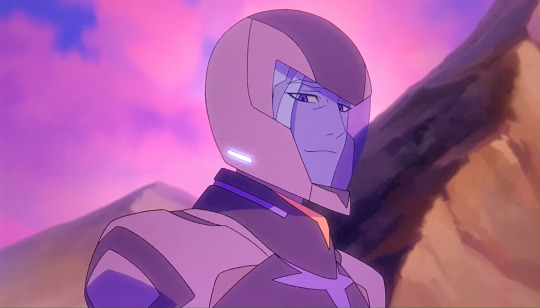
Allura infuses him with optimism, like no one else did before. She is the soothing salve over his old wounds, arriving into his life to open up a bright future. Oriande awaits them, the future awaits them. Hope and love bloom in his heart, and you can read it on his face, overlayed with the fatigue lines etched under his eyes. I know I’ve said this before, but I’m absolutely in love with Studio Mir’s clean drawing style, yet capable of rendering a vast array of emotions with just a few pen strokes.
Inside the pyramid, Lotor makes a few remarks, which reflect his curiosity but also his relative lack of instincts about what to do next. He relies on logic and educated guesses.
“The mysteries we seek are hidden somewhere deep inside.”
“We may yet to prove that we’re worthy to be here.”
“There must be a clue. Something a trained Altean would recognize.”
Similarly, when the Sages attack, his training guides him to apply known and well-rehearsed battle tactics - he’s ducking away from their spears. Allura has the presence of mind to pull out the compass stone, addressing them reverently, and Lotor - behind her - instantly mimics her gestures. Yes, he’s a fast learner, but it’s a bit too late for learning. The trial time is near.
The trial itself provides us with a head-to-head comparison between his tactics and Allura’s. They each apply themselves according to their upbringing, and therein lies the tragedy of his failure.
When he finds himself alone in the celestial domain, what do we see first, glowing in his enlarged eyes?
Fear.
He gasps as he opens his eyes, looks around warily, then calls for her, “Allura?” Without her, he is insecure, because he is not prepared for this; it’s a kind of trial he’d never attended before. (He aced the Galran Agotian trials, yet he clearly struggles here).
Of course calling out for her suggests he might also be worried about her, but I believe - from the hints given so far from their adventure inside the pyramid - that he is genuinely lacking confidence. He even stated so, as they began their journey: “None of my research or travels have prepared me for this. From here, we are on our own.”
And what do Galrans do when faced with their own fears?
Victory or death.
“I will never yield! I will gain your secrets!”
Here, I read pride, anger, determination, unwillingness to give in.

He doesn’t even consider another method; the emotional domino of fear-aggression is ingrained into who he is, from a young age. And in the end… his own aggression is his undoing.
If you take a look at Allura’s demeanor, she does not gasp in fear as she takes in her surroundings. She does not call for Lotor.
“I do not wish to fight. I come here seeking knowledge,” she addresses the White Lion.
“What can I do?” she continues, humbly.
“No. This isn’t the way. I seek the secret of life. I give my own.”
Notice the requirements of an Altean trial:
humbleness in the face of unknown;
non-aggression;
willingness for self-sacrifice.
Lotor, unfortunately, does not display any of these.
In the meditation practice, there is one particular method that helps ease anxiety, worries and fear of unknown. It involves staying with your own emotions, allowing them to unfold, simply noticing and embracing them. Fear becomes a friend which does not need to be battled, but acknowledged.
What Allura did was to basically embrace her fear of the White Lion, to allow the fear to manifest, and in doing so, she conquered it.
Conversely, by fighting with your own emotions, you only prolong your agony.
When the Life Giver tells Allura, “You are home, and the secret is already within you,” we finally understand why Allura passed this trial, and why Lotor failed. If the secret is already within her, she instinctively directs her actions according to the ancient practices and wisdom of Altea, where she grew up. At Oriande she is home.
On the other hand, Lotor is hard-wired into the victory or death philosophy, which guides fear in the opposite direction, that of aggression. At this time, Oriande is not his home, unfortunately. He yells, “No. No!” realizing his failure. It’s a cry of desperation, he’s angry with himself for his defeat.
It’s ironic though: he knows that aggression is not the way, yet he himself cannot overcome it. It’s also paradoxical, because he is searching for ways to bring peace to the universe. He preaches peace and prosperity, but he lacks the deeper understanding of how to fully achieve it. Living in such a hostile environment for millennia, we cannot but recognize that this is the way the environment shaped him. Nature versus nurture, exactly the words of one of the EP’s. Also, from the same interview: “It was a very bad hand. That deck was stacked against him in every way in his upbringing. If he had this amazing accepting family that Allura had, he probably would have been a magnificent person. He had to live his life the only way he could, and a lot of that was through manipulation and doing things the only way he could get them done. It’s tragic.” (Source: Den of Geek - The Ultimate Downfall of Lotor, June 28, 2018 - link in comments)
Despite his defeat, I found it admirable that he does not bear jealousy on Allura, honestly acknowledging her magical powers: “You are a true Altean alchemist. Oriande was for you, not for me.”
One thing I’m wondering though: did Lotor ever learn anything from his defeat? He is a fast learner, so how did he internalize this event? I’m sure Allura recounted to him how she came to pass the trial, so did he ever put the pieces together, to figure out where he went wrong?
————————————
After Oriande, Season 6 warms us up to his character even more. The encounter with Dayak in S6E1 provides us with precious comic moments that further humanize his character. Suddenly, he is not the stiff emperor with a royal demeanor and parlance, but the teenager who’s embarrassed about his mom, while trying to look cool around his buddies, which subsequently suggests that he cares about his relationship with the Paladins, also proven by the way he introduces them to Dayak: “These are my colleagues. They have more than my permission to speak.”
In addition, their dynamic gives us a moment to ponder on the type of Galran education he received. Now that we are fresh from the Oriande experience, learning how Lotor grew up - under the constant threat of the whipping pain - provides a better perspective into the kind of cards life handed him.
In the same time, let’s not vilify all his upbringing. As a prince, Dayak offered him the highest kind of education one could receive: “The history of our conquests, our customs, battle philosophy, the art of war.” Yes, they are all veered towards war-related matters, but those are subjects of vital importance to any nation, even in times of peace. The end of S8 will have Allura basically learn to navigate this dark side, guided by ghost!Lotor and the entity. As much as Lotor needs to learn from Allura, she also needs to understand and absorb his wisdom.
If one needs a summary of Lotor’s past, find it right within Lotor’s speech, broadcast across his empire: “Slayer of a tyrant, child raised in the void and taught on the battlefield.”
From the conversation between Lt. Lahn and Commander Bogh, it’s clear that Lotor’s dream of peace is too abstract for his subjects. There are prejudices against him that are hard to tame. Lotor is well aware of them; even his empyreal address reflects this issue.
But one particular conversation raised a red flag to me. At the news of Sendak’s attack on a mining planet, the Paladins offer their immediate assistance. Lotor says, “Sendak would have me respond to his attack and neglect my empire.”
Allura replies with determination, “Voltron can handle this, while you continue to rule.”
Lotor insists, “But Princess, I need you here. Without you—”
“Your plan has waited this long. It can wait a tick longer. We must protect your innocent subjects,” says Allura.
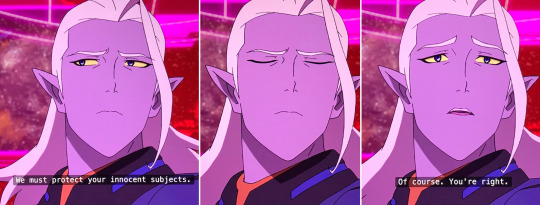
“Of course. You’re right,” Lotor acquiesces in Allura’s decision.
This, right here, introduces a major hint at a future reveal. Is Lotor going to allow an entire mining colony to perish under Sendak’s attack? (“sacrifice a few…” - rings any bell?) When Allura emphasizes “innocent subjects”, I read frustration, impatience… and something more on his expression. He’s obviously annoyed that his plans are being delayed. As he told Allura, “it is paramount” that they focus all their energy on infusing his ships with alchemy. He’s getting so close to his dream, and now Sendak comes to derail him.
This askance look suggests he is hiding something. And we read a conflict within him, in the way he presses his eyelids closed under a slight frown, then reopens them into a forced-amiable expression.
There are many ways to interpret his internal conflict:
which innocent subjects should he focus on first? The Alteans - his most precious people - with whom he hasn’t been in contact for a while, or the mining colony attacked by Sendak? What if the Altean colony is in danger of peril as well, and he’s tied up with empyreal matters?
maybe he is simply embarrassed that he let a “little” mischief slip past his mask? He’s never been put in a situation like this, working alongside honest, compassionate people, who care for the lives of others. Not that he doesn’t care overall - on the contrary, all he does is because he desperately wants to pacify the empire and ultimately free his Altean colony, but the way he goes about it requires cutting some… corners; translation - sacrifices.
maybe time is of essence; perhaps he knows things we don’t know about his colonies (there are many unresolved things about the Altean colony plot, so here I can only speculate).
all of the above?
In any case, this little detail adds an extra tint of gray to his character.
—————-------
S6E2 and E3 elevate the relationship between Lotor and Allura to a level of trust and fondness for each other that we haven’t seen them develop for others. Lotor genuinely loves Allura, something confirmed in interviews with EP’s. He is not simply using her for his secret agenda. What is blooming between them is real, and you can see it in the way he behaves around her, the gentle hand touches, the almost-kiss interrupted by the Paladins, their discussions while working on his ships, his excitement to share the “grand news” about the progress he makes on his Sincline. Allura is beginning to be the soul-healer of his past traumas; his optimism is soaring. He is able to relax more around her, as he truly trusts her.
————------------
S6E4 (“The Colony”) begins with Lotor, facing his Sincline ship, ready for the trip to the rift, telling Allura: “I’ve waited an eternity for this. […] It means so much to me to share this with you.”
The moment of his life. He’s waited for this for thousands of years. Thousands. Not decades, not centuries. The anticipation, the emotion, it must be like nothing he ever felt.
I loved the reference to the DotU little technical terms, as they prepare for the trip of a lifetime: “Infracells up. Dynotherms connected. Mega-thrusters are go.” It gives their relationship even more meaning and legitimacy in the audience’s eyes.
Pay attention to the comments the Paladins make, as Lotor and Allura enter the rift:
Lance: “Last time anyone got in there, it turned Zarkon evil.”
Shiro: “Zarkon fell prey to his own evil instincts. The quintessence field didn’t create them. It revealed them.”
I’ve used Shiro’s comment in the analysis of Honerva and Zarkon’s arcs as well, but the fact that the writers chose to insert it right before Lotor’s trip to the rift is a clear enough hint (albeit “evil” and “instincts” have nuances, just like Lotor’s numerous character shades).
When they enter the rift, there is a moment where Lotor’s eyes narrow a bit…

That, right there, is Lotor’s cunning expression he often displayed in the episodes before befriending the Paladins. It clearly points out to us that there is more going on in his mind.
An evil plot? This would be the immediate thought, right? Especially immediately after Shiro mentioning “evil instincts”.
Or maybe it isn’t an evil plot, but its execution is… less clean (“Lotor may have been misguided, but ultimately, he wanted to preserve life”). Hence, the evil-looking smirk. #LotorWasFramed?
“What we do here today will change the course of the universe forever,” says Lotor, while measuring the energy readings inside the rift.
Allura ponders over the quintessence effects, “In the hands of the wrong person, this power could easily corrupt.”
“Together, we’ll see it never does and continue the work your father started so long ago,” Lotor replies.
Two things:
Another warning: Quintessence in the hands of the wrong person…
“Together”: Yes, if they split up, things will go sideways.
“I can feel the quintessence coursing through me,” says Lotor euphorically, as they travel through the rift.
Allura, ecstatically sighing, replies, “It’s like my spirit, my whole being, is more alive.”
Quintessence is the space-drug of the series, it’s no doubt about that, even the EP’s have made the comparison. A double-edged sword, capable of conferring supernatural abilities and sensations, yet destructive enough to turn you into a Zarkon.
Not only Lotor is feeling its effects, Allura does too. Keep this in mind as I’ll discuss upcoming events.
For the first time in eons, his stars are aligned in the best possible way. They “accomplished something amazing” - entering the rift and collecting quintessence. He has the most powerful princess in the universe by his side, the gifted alchemist he so sorely needed for millennia. His plan is coming along fabulously.
But I think the most amazing accomplishment is that they finally confirm their feelings. The kiss happens. The bond that forms in their hearts is a potential catalyst for extraordinary changes, within themselves and to the universe around them. Double, triple euphoria for him.
-------------------------
Can this man’s life turn any more tragic?
The moment of… (alleged) truth happens. The moment we find out, through Romelle’s story, that Lotor has been harvesting Alteans for their quintessence, for generations. The conclusion of her accusations is that he has been draining the Alteans for his own power and glory.
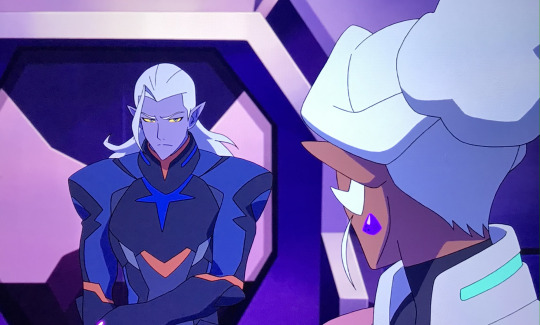
(Notice the general expression of guilt: self-hugging, chin dropped to the chest, peeking from underneath his frowned eyebrows)
DESCENT INTO MADNESS
Let’s see, from Lotor’s perspective, what shocking events he goes through, to understand the underlying cause of his mental breakdown in S6E6.
1. Physical rejection by the woman he fell in love with.
Right after the high of their kiss and their rift breakthrough, he finds himself at gunpoint, accused of mass murder.
In reply to their accusations, Lotor says, “You know nothing about what you speak. […] Allura, listen to me. I’ve dedicated my life to preserving Altean culture. Now that we’ve unlocked the quintessence field, all of your people, who would have been hunted down long ago had it not been for my intervention, can live in peace. Were some lives lost in the process? Yes. But they were martyrs to a noble cause. I sacrificed a few to preserve the future for millions. Allura, do not let this ruin everything we’ve worked for. Think of what we experienced in the quintessence field.”
From what he says, we can deduce exactly what I’ve pieced together so far: that he was deeply preoccupied with preserving the Altean life and culture - he “dedicated” his life to it. This was his purpose in life, it was what he cared most about, and every action, every little or grand mischief that we’ve seen so far along the seasons, they all point to one sole purpose: pacifying the universe so he could bring his Alteans out of their hideout, so they can “live in peace”. They were his Mother Altea - metaphorically, the mother he never had.
His explanation is vague enough that we don’t understand some essential aspects about the “martyrs”, but also, his approach to Allura, right after such horrifying news, touching her hand while reminding her of what they “experienced” in the rift, obviously rubs her the wrong way.
Fresh from the rift with a dose of ultra-pure emotional enhancer called quintessence, Allura reacts violently, without seeking more answers. From here, things quickly roll downhill.
2. Being taken hostage.
3. Facing the truth about his mother, Haggar/Honerva.
For some reason, this event in his life never seems to be a subject of much discussion. I believe this holds a large role in his traumatic rollercoaster before the battle with Allura. The discussion with Honerva reveals the fact that he is still in denial about his mother’s downfall. His fists tremble in anger - another sign of emotional gravity.
According to him, his mother “ceased to exist when Honerva drew her last breath”, while Haggar represents an “abomination”, “a twisted perversion of what was once so pure and beautiful”. If you want a little Transactional Analysis (TA) parallel, this is exactly Child-Lotor from the other reality, saying: “No. My mother is dead. And you cannot replace her!”
What I find even more dramatic is that his entire life he’s been compensating for his lack of maternal love by completely immersing himself into the Altean culture, while his biological mother did everything to thwart his efforts to connect with his maternal legacy.
This is a huge blow to his internal set of values, and the fact that he reacts with total denial suggests (again, applying TA) that, with his fears confirmed, Child-Lotor feels cornered, afraid, trapped, thus his reaction of rejection towards her.
Bear this in mind, because I believe at the core of Lotor’s tragic turn in this episode resides a wounded Child.
4. Attempting to fix it, under pressure.
He is being punched from ALL directions.
Yet he persists.
His urgent priority? Finding Allura.
Even though Acxa explains that it will take a while to get back to the castle of Lions, he replies: “Then what are we waiting for?” I read desperation, a rush to try to fix things.
Although Allura tossed him to the ground, he holds no grudge against her.
Why does he return to her?
Why not the colony?
After all, it was his most precious planet in the universe! Oh, but this is not a tactical decision… It clearly stems from his emotions - he will soon confess it as well - because he truly loves Allura.
The fear of losing her is greater than his fear for the colony. Now that the secret is out, now that he knows that clone-Shiro was Haggar’s spy, it must be clear to him that his colony is completely exposed. The Altean civilization that he worked so hard to protect from the evils of his parents is inches away from being overtaken by Haggar, yet he flies right back to Allura! How telling!
Oh, but the way the story frames it leads us to believe that he wants to get back to the rift due to his greed for more power, because that was Allura’s conclusion about why he was returning: “He needs to get back into the quintessence field.”
No he does not. His Sincline can jump in and out of the rift at his own will, so he can access the rift from anywhere. He explicitly said to his generals that, “We’re headed to the Castle of Lions’ last known location.” (S6E5) He’s not headed to the rift, he is headed towards ALLURA.
“Accessing the quintessence field has been Lotor’s singular drive for millennia. He wants to harness the power for himself, but we cannot let him,” says Allura in S6E6. Wrong. What did he just explain to her earlier? “Now that we’ve unlocked the quintessence field, all of your people, who would have been hunted down long ago had it not been for my intervention, can live in peace.” Accessing the quintessence field does not reflect his final goal, it is a means to a higher purpose: freeing the Alteans.
5. The fallout. The dam-breaking moment.
Let me start by saying that Lotor is generally a calm and composed character - a mask he has built into his persona and practiced it for millennia, because he needs to display confidence, not weakness, around both his subjects and his enemies. It is the way of the Galra. Also, the attribute of a leader.
That doesn’t mean he does not show moments of panic or outbursts of anger. On the contrary, we witnessed them along the episodes: when killing Narti, when flying into the solar flares, the moment he kills Zarkon, when snapping at Allura… These little slips hint at the true emotions roiling underneath his mask. Most of us understand this mechanism; think of school exams and how anxious we felt inside, despite displaying a relatively calm expression while entering the test room.
Given the extraordinary tension of the negative events that befall right after his most triumphant moments, what are the odds that behind this façade, Lotor’s anxiety is at an all-time high? The fact that he does not show it yet doesn’t mean it’s not there. But we’ll begin to see it, as soon as he starts talking to Allura.
En route to Allura, Lotor tells his generals: “Zethrid, Ezor, my deepest apologies for lying to you both, but in order to gain the princess’ trust, and make the Paladins of Voltron believe we were truly at odds, it had to be done. […] Today we will gain access to unlimited quintessence, and together, we usher in a new era of power.”
Did he just slip back under another one of his facades? Did he truly trick Allura and the Paladins? Perhaps yes, but not in the way we are led to believe.
What he says is true - he did have to pretend to be at odds with Zethrid and Ezor in order to gain the Paladins’ trust. Imagine the chaos (not that we wouldn’t have enjoyed it) these ladies would have brought to team Voltron. Would Lotor risk his reputation with such “scoundrels” around the innocent Paladins? I mean… Zethrid replies, “As long as I get to blow something up, I’m good.” That wouldn’t fly with Allura.
Lotor basically gave each side what they expected to hear, while he pushed forward with his agenda. In order to gain Ezor and Zethrid’s trust again, he had to explain himself, and he doesn’t really lie, does he?
But what’s up with ushering “a new era of power”? Hehe, this is where we all get tricked into thinking he wants all the power of the quintessence for his own glory, thus we’re mentally confirming what Allura just said: “He wants to harness the power for himself.” Wrong again, and I’ll link this up to his next statements.
After the Paladins destroy the inter-reality gate, they ready themselves for a confrontation. They expect Lotor to come with guns blazing. Hunk even calculates the odds of three Sincline ships to four Lions. Lance, the team lead in Keith’s absence, orders: “Hold your positions. Let Lotor make the first move.”
Well, Lotor’s first move, even after seeing the gate destroyed, is to seek peace. He does not lie in any of his statements; these all tie in together with what he’s been saying so far. “We need not fight today. We are all on the same side. I know what you all must think of me now that you know my past. It doesn’t have to change our future together. The truth is, I want to harness the power of the quintessence field to better the universe, just like I said. Nothing has changed.”
Allura, raising her voice, replies, “You enslaved countless Alteans. Harnessed their life source for your own personal gain. How many innocent lives did you destroy?”
Lotor calmly attempts to explain: “Allura, I—”
“How many?” she roars back, without allowing him to finish.
(What was he going to say? He was clearly going to divulge exactly the key detail we are missing from the colony story, but Allura, whose temper is out of control, diverts the subject.)
After a deep breath under closed eyes, Lotor replies, “It’s true. Many Alteans perished in my quest to unlock the mysteries of quintessence. But I protected thousands more, and I rescued their culture, our culture.”
Comparing Allura and Lotor’s demeanor, it’s clear that Allura is the fire-starter. Not without reason though; from her perspective, one of a victim of mass-destruction, she has every right to be mad, and we, the viewers, sympathize with her.
On the other hand, Lotor seems to keep it together. He truly loves her, otherwise he wouldn’t try so hard for a peaceful solution. Even Zethrid asks, confused: “Why is he pleading with the Paladins? Why are we not opening fire?”
Ezor says, cynically, “I stopped trying to figure out Lotor’s master plan long ago. Too complicated!”
The only one who seems to comprehend what’s going on in Lotor’s heart is Acxa, who casts a worried glance towards him. Worrisome indeed, because heartbreaks are most terrifying, if things go out of control.
“Allura, you must understand I’ve given everything I have to plumb the depths of King Alfor’s knowledge, to unlock the mysteries of Oriande. Please, Allura, we’ve come too far together. Surely, you can see the greatness we’ve already accomplished. There’s still more to come. Join me. We’re on the same side.”
“No, we’re not!!” Allura screams at the top of her lungs, blasting her Lion’s canon at him.
Notice, Allura fires the first shot. Lotor, in response, yells at his generals: “Hold your fire! Hold your fire!” Acxa is sweating in tension - because she intuits how bad this could go. Zethrid is frustrated, while Ezor looks completely confused.
Lotor, keeping it together with his last emotional energy, is desperately trying to reach Allura. His voice trembles from the emotion, from the utter despair and anguish. His pupils have narrowed, eyes wide open. He sees his most precious relationship falling apart, he’s clinging to a last thread of hope. Allura is the one true love he met after ten thousand years of traumas and the most gifted alchemist. He has given everything he had to arrive here.
Altea awaits them. Together they could bring their people out of the shadows, they could rule a New Altea, “a new era of power” as he told his generals.
“Allura, stop! You and I hold the ancient knowledge of our Altean culture. We were meant to be together. My feelings for you are true - and I know you have feelings for me as well.”

Cry as many rivers you need to, because this is the most tragic declaration of love.
Lotor, right here, wears his heart on his sleeve in front of everyone to see. Vulnerable, open-hearted, sincere - perhaps the most sincere declaration of his entire life, he opens himself up to Allura, he puts his trust in her, with all his wounds and unresolved traumas of the past.
Remember the “I’ll be fine” reply after defeating his father? No, he is not fine, his wounds have never healed.
This is why Allura’s reply falls like a guillotine on his already ravaged soul.
“You betrayed and used me. You’re more like Zarkon than I could have ever imagined!”
Comparing him with Zarkon? The one man who destroyed his life, who terrorized him for eons? We’ve seen his irked reaction to this comparison in the past, but now? Now the emotions are at all-time high. His bleeding heart is out for her to see, and she slays it, full-force.
Every trauma from his past converges here. This is the boiling point, the dam-breaking moment. This is where his hope dies. The moment of agency. (As I said in the beginning, at the critical point of the madness arc, whatever breaks the dam is a world-shattering event: extreme grief, total loss of loved ones, closest allies and friends, the breach of trust towards the world, or a combination of these. The character will try to fix the world and/or get back at the ones who hurt him.)
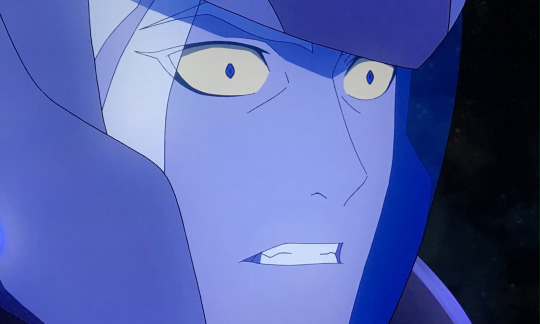
The shrilling noises of the soundtrack make us cringe, like we could feel the shiver that runs down his spine as his heart suddenly grows cold. He replies with a stark voice. “What about your father? He may have been a master engineer, but Alfor was too weak to defend his home world. I’m the one who had to step up and save our entire race. Who are you to question my tactics in bringing peace and prosperity to the universe?”
Remember his similar reply when he was a prisoner in her castle? It’s his gut reaction to a most sensitive subject: his father. She wants to talk family? He’s punching back with brutal opinions on Alfor, because at this point he desires nothing more but for her to feel the same kind of pain.
“Who are you…?” She’s a stranger. Someone who doesn’t have a place in his heart anymore.
“Destroy the Lions,” he orders his generals over a cold expression. He’s made his choice.
Hell breaks loose.
If you think that the negative effects of the rift trip applied only to Lotor, let me put this in perspective:
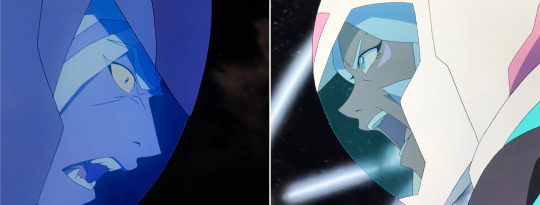
Allura is equally overloaded with adrenalin. And from the battle scene, we can see that she is the one attacking him first, her roar as loud as her Lion’s. As the fight continues, Lotor perfectly executes evasive maneuvers around her, continuing to keep a blank expression, until… he erupts, like a volcano of unresolved, under-pressure turmoil:
“Once I wipe out Voltron, I’m going to start a new Altea. An Altea that will never know of Princess Allura or King Alfor. Nor will they know of the Lions of Voltron. All they’ll know is me, their great leader! Hahaha, I’m ready to wipe the universe clean of all my enemies. Voltron, Haggar, and the rest of the Galra!”
Here’s where many of us got him wrong, thinking that this has been Lotor’s real intention from the get-go: to destroy Voltron and rule a new empire for his own glory.
The only way I can properly explain this is through the psychological mechanisms - not only what goes on in Lotor’s mind, but in our mind as well.
1. Let’s start with us. The script so far played to convince us that Lotor planned this evil plot all along. How did we get tricked? Through all the little hints dropped along the way, which I already pointed out. Our knee-jerk reaction naturally ensues as “A-ha, I told you so.” However, many of us began to have doubts.
2. Shifting the focus back on Lotor, here’s what I said right after the scene with the destruction of Ven’tar’s planet: “after Zarkon destroyed his heart, Lotor ran straight into the arms of Mother Altea”.
I remember, earliest childhood memories, that if I was mad at my dad, I would run to my mom. If I was upset on both of them, I’d cry for my grandparents. It’s only natural that the child seeks love, affection, protection, and as we grow older, that Child within us, with all its basic emotions and needs, continues to coexist underneath our Adult.
The bigger the wounds of the past, the larger the needs of the inner Child.
What happens when the Child within us loses all emotional contacts, all the love and support it sorely needs? When all our friends and allies are gone, when we lose contact with reality, when the closest friend and lover stabs us in our deepest wounds… where do we go from there?
Where did the wounded, cornered Child-Lotor escape, away from the cruel reality around him?
What was his last refuge? His last place where he he would always be received with unquestioning devotion by the masses?
ALTEA.
The Alteans praised him as a god, a messiah, their savior. His statue dominated their landscape.
Altea was his life-long project, the only heritage from his real mother, the place where he poured all his passion (“I’ve dedicated my life to preserving the Altean culture.”). Until he met Allura, that had been his only source of love and joy.
Altea was the family he never had.
Who we see here, screaming and kicking, is the wounded, cornered inner Child, irrational, filled with pure negative emotions. There is no reasonable Adult in the picture, no normative Parent, just pure madness. Fear leads to aggression (the Galra way), similar to his reaction of slaying the Lion at Oriande. He screams about becoming the great leader of a new Altea that will never know of Allura, Voltron, Alfor, etc, because ALTEA IS HIS LAST PLACE OF REFUGE, where he hopes to forget about this painful past. Child-Lotor is hurt, deeply hurt, he wants destroy all who wounded him, then run away into the arms of Mother Altea. He descends into madness with guns blazing, ready to get back at those who hurt him, and in an ultimate irrational cry, he includes the Galra in his list of mortal enemies, because they, too, hurt him when he was a child.
He bitterly comments: “Even my generals betray me!” A self-fulfilling prophecy, as he becomes disconnected from literally everyone.
Acxa yells “Lotor, don’t do this!” as he ejects them one by one from the ships. She knows what he’s about to do - form the Sincline robot, because she worked on building the ships. She knows how powerful it can become and realizes how far Lotor is gone.
Sprinkle quintessence atop the irrational, negative emotions and the cocktail for disaster is right there.
Quintessence “reveals evil instincts” indeed, because
negative emotions are evil,
and emotions are instinctual (the definition of emotion is “a natural instinctive state of mind deriving from one's circumstances, mood, or relationships with others”).
Allura recognizes it during their battle inside the rift, when the Paladins begin to drift into rage. “We have to get out of here,” she yells. “This is exactly what happened to Zarkon. Exposure to all this quintessence turned him into a monster!”
—> So, did Lotor harbor “evil instincts” all this time? Well, we all carry negative emotions. The Paladins did too, when they screamed “Let’s destroy that guy!”, “Finish him!”, except that Allura pulled the plug before they could all become corrupted (the best way to prevent drug dependence is to not get exposed in the first place).
—> Does this confirm that he’s been planning this plot all along, that he truly wanted to become the all-powerful, “great leader” of a new Altea that would obliterate Alfor’s legacy? ABSOLUTELY NOT. It only proves that what happened to Lotor was a tragic descent into madness, a resultant of unresolved mental illness accumulated along the millennia, enhanced by a series of misfortunate events and misunderstandings between him and team Voltron, and blown out of proportions by quintessence (and maybe the little entity inside him, too).
After S6 dropped, viewers were complaining that they did not recognize this Lotor, that this was a different person. Well, remember what he said about his mother, when inspecting her science log? “By the end of these logs, it’s like they’re written by a different person. She’s frantic, paranoid, erratic. Her reason and intellect are gone, replaced by fear and paranoia.”
Voilà.
So then, what did Lotor want when he was in his right mind?
Exactly what he said: to bring Altea out of the shadows, into a universe free of violence. Bonus: having Allura with him meant that together, they made sure the quintessence never got into the wrong hands (idealistic, I know, but the man had a dream). Ruling alongside Allura, the “royal alliance”, would have been his most blissful destiny.
Did he plan on destroying all the Galra? I don’t believe so, because he told Allura that he wanted to “meet the needs of the Galra”.
Maybe get rid of some inconvenient warlords? For sure, they’d all rot with the ice worms.
Maybe install an Altean leadership instead? “A new era of power?” It’s quite possible that might have been in the back of his mind. Who knows, maybe it would have turned just like the alternate reality where the Paladins traveled, where the enemies of Altea were turned into “non-cogs”. Anything is possible, we’d have to ask the writers what they had in mind.
Did he dream of becoming the “great leader”? Maybe not in a megalomaniac way, but he probably envisioned himself as a benevolent emperor, since he had a huge need for validation and love. His giant statue is a testament to that.
Did he want all the power for himself? No. All evidence points to the fact that he was willing to share it with Allura (“royal alliance”), with Voltron, with the Coalition. He even tells them, through boiling wrath: “It didn’t have to end like this.”
Some voices insist that Lotor could have told Allura (at least Allura, not the others) about his secret colonies, but because he was hiding that, it meant that he was hiding evil intents. No, he couldn’t tell anyone, his hands were tied because of Haggar stalking him. When Allura was piloting Voltron, her mind was connected with the rest of the Paladins. If Haggar had access to clone-Shiro’s mind, what would prevent her from tapping into the others’ minds?
“Now we will see how Alfor’s legacy stands against the new Altean defender!” screams Lotor during his clash against Voltron.
Altean… DEFENDER? I know this is irrational Lotor talking, but maybe this had been his plan all along? To create defenders for Altea, machines capable of fending off Galra invaders? If this is what his second colony was all about, then Allura’s visions in S8 also make sense - her mother telling her about protecting Altea against the Galra. Speculating.
As the battle heats up, Sincline jumps in and out of the quintessence field at will. Along with that, we begin to see him turn more and more rogue, as the quintessence gradually poisons him.
“Unlimited power is mine. All realities will fall to the new Altean Empire.”
A new Altea, a new Altean defender, and now… a new Altean Empire. At the peak of his madness, new delusions of grandeur emerge - yes, now he wants unlimited power - but perhaps we can also take a little peek into his secret wishes? He’d dream of replacing the Galra ruling with an Altean leadership? It would make sense, since he loved Altea so much.
These are 100% madness tantrums: if nobody loves me, I’ll destroy all of you and rebuild my own world.
It very much resembles Honerva’s peak of madness: “If I cannot experience the simple joys of life, why should anyone else?” (Translation: If nobody gives me what I want, then screw you all.)
-----------------------------
We know the rest of Lotor’s arc, or what remains of it. Left in the quintessence field, then recovered by his mother in S8E6 “Genesis”, and, for the following episodes, Sincline is dangled in front of the audience like a carrot, only to wave goodbye to his ghost in the end, with a short “he deserved better” conclusion. Oh, let’s not forget about the cOrPse.
—————————————
Earlier I talked about the “alleged truth” that Romelle brought to the story, because up to this date we don’t know exactly the entire backstory of the colony, yet…
A. We were told all along the remaining of S6, entire S7 and almost all S8 that Lotor was
“a monster” (Romelle, S6E4),
“a murderer” (Pidge, S6E4),
someone who “fooled” everyone around him for his own power (Allura, S6E6),
who harnessed the Alteans’ life source for his “own personal gain” (Allura, S6E6),
a man who “preached unity, but in the end he only sought power” (Acxa, S7E3),
who “used” his allies, leading them down “a painful path, a never-ending cycle of destruction and loss” (Acxa, S8E5)
B. Out of nowhere, Allura exonerates him in the last episode of the series, asking Honerva to “honor” her son: “Lotor may have been misguided, but ultimately, he wanted to preserve life.”
So which one is it: A or B?
You don’t suddenly honor someone after you called them “murderer”, power-seeking “monster”, unless… something of extraordinary importance has been unveiled, to properly provide an exoneration of his character.
Was it ever unveiled? No.
Then, rational deduction… #LotorWasFramed?
I think so.
It started as writers’ deliberate story framing (proof provided in my above analysis), leading the audience to believe in a “he-was-evil-all-along” nature of Lotor, with the clear expectation of a much larger reveal later down the series, that would subvert the “villain” trope. In my opinion - based on logical deductions and supported by evidence of altered animation circulating in the fandom extensively, the big reveal was excised from S8, the only clues left residing in… metaphors and visions - Allura’s visions.
Reason of such excision? Just like the tragedy of Lotor’s arc, the tragedy of VLD lied in the conflict between the IP owner’s commercial target (toys for boys aged 6-12 and robot cartoons with classic, simple tropes such as good vs. evil, boy-hero gets the pretty girl, etc) and the actual execution of the story, which deployed complex characters like Lotor, Allura, Honerva, the Paladins, and so on, embraced by a different audience niche. Yet, even if the finale of S8 attempted to erase such complexity in order to realign the series with the aforementioned commercial intent, the creators nevertheless managed to insert their concluding message into the final episode - Lotor ultimately wanted to preserve life - thus, he deserved better.
———————————————
Season 8, although I consider it incomplete in regards to Lotor’s arc (and other arcs as well), does provide us with some interesting hints at what could have been, if the story hadn’t been altered, which would have further elucidated Lotor’s overall arc, because these hints contribute to showing us his true nature.
—> In S8E6 “Genesis”, Sincline has the target locked onto Allura, yet it does not open fire. We clearly see through Lotor’s eyes, as he readies his aim.

There is no doubt that a sentient soul coordinates the decision not to shoot. This reminds me of Zarkon’s singular confession to his son: “She was my only weakness.” Similarly, Allura is Lotor’s only weakness.
This scene begs a series of logical questions (*cough*, I love logic): if a sentient being operates Sincline, how can Lotor be dead? A dead man cannot operate Sincline.
If Honerva uses the entity to remote-control her living subjects and she also remote-controls Sincline, then logic would suggest that… a living subject, infected with the entity, inhabits the cockpit. Not a corpse.
Honerva tells Allura: “I am the only thing keeping my son at bay.” Um, she can’t really keep a dead son at bay, can she?
If he’s alive, then why are we shown the suggestion of a corpse, in S8E10? Or was it another altered scene? NB: static images are easy to redraw.
Also, motes of purple quintessence effuse from the “corpse”. We’ve seen these before, with Zarkon and Honerva right after coming back from the rift.
If the assumptions above are correct, then this scene would further align with what I have said in my previous metas regarding Zarkon and Honerva: the entity’s takeover happens as a gradual progression towards complete disconnect from self. At this point in the story, Lotor would be at the far end of the madness spectrum, completely possessed by the entity and overloaded with quintessence. This would create a coherent story, paralleling those of Zarkon and Honerva.
This theory about Lotor having the entity would also justify the next point:
—> Allura’s visions in S8E8 are a rich source of information.
Just like Honerva can telepathically connect with her subjects via the entity, if Lotor has the entity and he has a strong attachment to Allura, then he is telepathically causing her dream.
Since what Lotor tells Allura about the entity turns out to be true, why wouldn’t the other elements of her dream be true, too? (“nothing ever truly goes extinct” = he’s not really dead; “we both seek to destroy Haggar” = Lotor has been fighting Haggar all along; he’s showing her how to fight Haggar, because that’s how he did it in the past - and that can be seen as an explanation for his second colony, because it clearly implies that sacrifices have been made).
If Allura’s dream provides an allegory to Lotor’s second colony, it would justify the meaning of Lotor’s words: “they were martyrs to a noble cause.”
Also, this statement would provide backup: “Many Alteans perished in my quest to unlock the mysteries of quintessence. But I protected thousands more…” If he was looking for a way to use the entity and the quintessence to defend his colony against the Galra, then he was definitely on a quest to unlock their mysteries, to protect the thousands more.
In this context, the heist of the teludav lens in S3E6 has a justification, as he may have intended to use Alteans to operate it, in another one of his “quests”.
Although the origin of the clandestine, pure white vats of quintessence was never fully explained (the quintessence allegedly extracted from the second colony Alteans actually looked quite purple), the story made it clear that Lotor was using the ultra-pure variety to infuse at least his Sincline ships with it. If he calls his Sincline the new Altean Defender, perhaps he tested other vehicles as well, using that pure white quintessence?
These would all tie together his arc, and the last statement of the story would make absolute sense: “ultimately, he wanted to preserve life.”
—> Aside from these remarks, there are many other metaphorical takes to Allura’s vision.
Ghost!Lotor visiting Allura in her bedroom immediately sent my thoughts to a folklore myth that is common to many cultures, from South America to Africa, to Northern and Eastern Europe and beyond. The “incubus” is a demon or a soul that visits sleeping women, in some traditions thought to be a man who was rejected during his lifetime by a woman, seeking to get back to his lost love. A symbol of unrequited love, erotic temptations or female desires, the incubus bears many names, according to each folklore. “I thought you’d be happy to see me,” says Ghost!Lotor, perhaps reading her mind?
“The ancients believed that all of life began with a single juniberry flower.” Foreshadowing the last episode’s rebirth of the universe, perhaps Lotor was supposed to accompany her in the grand restoration?
————————————
Even without S8, my point is that Lotor’s story followed a madness arc, slowly evolving along his multi-millennial life, and subtly hinted at throughout the show. Despite arriving at the same level of insanity as his parents, the reasons for his downfall were truly tragic, and, had the last season been allowed to develop as intended by the writers, Lotor would have been vindicated through a fully-fledged arc, just like his parents - thus, he deserved better and, in my opinion, the writers deserved better. The proof is in the details, and I’ve zoomed in quite a bit during this analysis. VLD gave us an amazing show with complex characters and most inspiring animation art.
This is probably my last meta on VLD. Going forward, I’ll focus more on the bright side of things: fan art and fanfics. See you on the other side! 😘
#lotor meta#lotor#prince lotor#mental illness tw#ptsd#childhood trauma#voltron meta#vld#psychological analysis#lotor deserved better#long meta - whew#I just couldn't stop writing LOL#there is so much depth to this character#I had this meta on my to-do list for a year#finally got around to write it#thanks for reading
50 notes
·
View notes
Text
Random BNHA Analysis (Again)
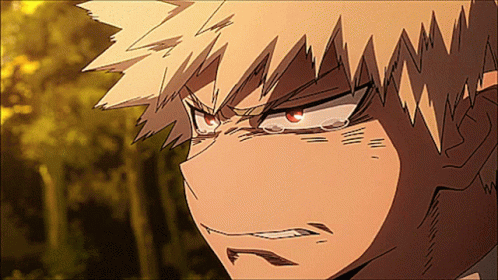
Hiii, so since yesterday I went on a whole 30 min long analysis after my first post. So today I'm going to be ranting about....buhbumdadaaaa
Katsuki Bakugo's Mentality! 🤯
It's long, but analysis usually is, so, oh well! Don't read if it's a problem for ya! 😜🤪
If you like this, check out my BakuDeku analysis!
💥💥💥💥💥💥💥💥
From the beginning his brain is warped into thinking he's the best. Those with Quirks on top, Quirkless the bottom.
Him? He's above them all.
He was taught that from the beginning.
"Your Quirk is so amazing."
"Your Quirk is the best."
Constantly getting those statements before you can even explore the world with this Quirk... Leads to a type of brainwashing.
So now as a child he has a superiority complex, due to society.
But then there's someone who breaks this molded ideal.
Izuku.
See, Bakugo is taught that people without Quirks are less than. Yet this little boy is brave and saves people despite not possessing one.
This makes Bakugo get angry because he contradicts what he's been taught, yet deep down he admires him for it.
In his mind he feels like he has to remind Izuku of his place. "I'm just helping you, maybe you got lost, this is where you're supposed to be. That's what I learned."
Izuku never stayed in that place, he always hoped for more. And when someone is brainwashed, it really ticks them off if someone breaks the mold they learned.
And when Izuku actually had the guts to stand up to him, it was past just the hopefulness. It probably scared him a little. "That's not what you're supposed to do!"
When you're brainwashed, something contradicting what you've been taught can be scary. Because then it makes you question what's really true.
I feel like the icing on the cake was the Hero versus Villains lesson.
First, the one who he thought was weaker than him stood a chance against him and WON.
This contradicts that people without Quirks are weak, especially considering Izuku had one now.
So in his mind, he probably thought he was tricking him. And if anything, mentally reassured him and disappointed him.
Assurance because, "Okay, now you're not contradicting what I've been taught."
But deep down, "I admired you because you didn't have a Quirk and did what you did, but you have one you've been hiding the whole time?"
Then also because of his superiority complex, "How dare you think you can trick me? You think you're better than me?"
But all this time something else has been building, and it cements itself in his brain when he sees Shoto's skill.
Bakugo gets a reality check when he sees that someone is stronger than him. And it scares him.
It's the start of his inferiority complex.
So now he starts to feel inferior, and tries to find ways to still prove to himself that he's the best.
The Sports Fest was about proving to himself that he was still good enough, not everyone else.
But when his win wasn't because he actually won, but because Shoto fell unconscious... He wasn't assured. If anything, it made his inferiority complex worse.
Then comes his internship. He was chosen because Best Jeanist wanted his personality to be corrected, his appearance.
Usually people fawned over his Quirk, but B.J. kind of brushed it aside.
"Yeah, you're Quirk's good. You know how to use it, but your personality sucks."
And this made him defensive, cause time and time again he'd been getting comments about his personality. And this is another contradiction, because he'd been raised this way. This is his normal. But there are people telling him it was wrong. Which makes him question things.
He also gets upset because he felt like he didn't learn anything to help his Quirk grow...
Not even realizing how much this would help him later. Which is why Jeanist became special to him after, too.
But back to that later.
Exams.
That also made his inferiority complex worse. It wasn't an easy win and he had to count on Izuku of all people.
This made him feel inferior to even him.
He was relentless and didn't want to give up because he didn't want to let himself down and feel like he's less than.
But he fell unconscious and needed Izuku to help him win.
I feel like because of that, he didn't want to be seen by anybody. So he avoided the class shopping trip.
Then I Island happened, again, he felt like he got to prove himself a little.
And after, camp.
The kidnapping.
Which was a lot more traumatizing to him than he let on.
His inferiority complex really hit him in the chest when he was the only one who got kidnapped. (After people already recognized him everywhere for the Sludge Villain incident where he was helpless ((which was also more traumatizing than he let on)).)
The only one people thought would go to the villain side.
And All Might stepping down from number one after saving him.
He was probably already beginning to blame himself, but what cemented the feeling, I think, was his mother's words.
"It's your fault. All this trouble is your fault."
Because that's what he says to Izuku when he confesses how he feels.
"It's my fault."
He sits in the blame he feels like everyone has on him.
Then once it's confirmed that Izuku gained the Quirk from All Might, his admiration is back.
And slowly, in this time, he realizes what Best Jeanist's point was.
Not everything is about Quirks, he needs to work on who he is.
So he starts working on his personality slowly outside the spotlight in season 4 (anime). Then it shows in Season 5 (anime) when he works with his team much better than before.
Season 6 (anime) he finally apologized to Izuku, which he had to grow past his pride to do.
And as time went by throughout the series, he desired to be Izuku's friend, like it should have been. He just had to learn to jump over the wall society put around the two of them. To learn that it was okay to be friends with someone Quirkless. To learn that there was more to people than their Quirks to define them and what they'll do.
He had to break from the mold.
And Izuku was a piece of that puzzle, as well as Eijiro, who opened him up to feeling equal with other people. Having people he could feel equal to. Having those he could appreciate even if they weren't at his level in terms of power. Someone real, who wasn't only his friend because of his Quirk. But really wanted to get to know HIM.
He's continuing to grow.
Just jumping in to save someone without thought? And Izuku at that? He wouldn't have done that months back.
If you think about it, his development has been the most teenager like.
But I think his pattern of development was different and made sense. He needed to learn how to focus on himself more than growing his already powerful Quirk because it was all that mattered to him.
And needed to learn how to love himself genuinely and love others.
Everyone else majorly needs to develop their Quirks, so outside of it being society's focus, that's where they need to grow the most.
Katsuki, on the other hand, is strong in what he can do with his Quirk. Just...not his identity outside of what he was told and molded to.
And how much he's grown so quickly shows that he probably already had a desire to, but didn't realize.
And even though he's fictional, as someone who loves to see people real or not grow...
I'm SO proud of him.
I can't wait to see how else he develops.
#bakugo#anime#teenandbeyond#katsuki bakugou#bnha analysis#mha analysis#bakugo katuski#Bakugo analysis#bakugo katsuki analysis#anime analysis#character analysis#psychological analysis#bakudeku dynamic#character growth#bnha#mha#my hero academia#boku no hero academia
20 notes
·
View notes
Text
Dagur's Diagnosis

To begin, I am not, repeat, not an expert. I like Psychology and have fallen in love with the DSM-5. Because of an unhealthy obsession with Dagur, I have decided to see how I would diagnose him if I had to. So, please do not take these to heart. It's just my opinion from what I've seen him do and what I've read. Also, major spoiler warnings since I use some scenes for examples. With that out the way, let's begin:
For some background info, when a disorder is first called “unspecified” or “other specified,” that means that some of the symptoms are exhibited in statistically significant ways, but the criteria is not fully met. Their only difference is that the therapist didn't say said which are not shown and which are or they did, respectively.
Other specified ADHD: Dagur does have symptoms of inattention with not being able to sustain attention on one thing for a while (shown in earlier seasons with him getting bored/impatient in a matter of a few seconds and in the finale with him being bored on Berserker Island since there was nothing to do). He does not qualify for the full criteria of having 6 + symptoms such as forgetting what he is doing, losing items, or avoiding tasks which make him have to focus for a while. If anything, he can get fixated on things. He also lacks the criteria for hyperactivity, including fidgeting (although I do like to include it for some fanfics), not waiting your turn, etc., but he has two disorders commonly associated with ADHD which are the following.
Oppositional defiant disorder: This involves ongoing anger, arguing, defiance, and irritability towards parents/authority figures. Dagur was shown to be very rude towards Stoick when he was a kid and spoke disrespectfully about his father as well. He also disliked Alvin taking charge. Even though he agreed to seemingly team up with the Grimborns, he didn't like working for them either.
Conduct disorder: This is characterized by having a difficult time following rules and behaving in socially acceptable ways. These people might become bullies or hurt animals (the former of which I think he was inadvertently towards Hiccup when they were kids and the latter of which he very intentionally was doing with dragons).
Disruptive mood dysregulation disorder: Dagur has severe, recurrent temper outbursts which aren't explained by manic or hypomanic episodes associated with bipolar disorders. These outbursts are for most of the day, nearly every day, and observable. Even when he's trying to be better, he regularly yells at people like roaring at Astrid in "Chain of Command" when she tried to calm him down and yelling at his Berserkers to shut up when he was trying to address them.
Posttraumatic stress disorder: With his experiences in jail, I believe Dagur now has this and is traumatized/has trouble sleeping with nightmares (one at least shown the only time he was shown sleeping in "Enemy of My Enemy.") This could also explain the bags under his eyes not seen on most of the other characters, especially the younger ones. Other symptoms include avoiding the distressful situation (he used humor immediately afterwards to dismiss it), distrusting others since he used to only trust himself, blaming others like those on his revenge list he tattooed to his arm, and being in a persistent negative emotional state. He engages in verbal/physical reactions of violence with little provocation, can be reckless, and probably has sleep disturbances.
Unspecified neurocognitive disorder: I think Dagur has this since he has issues of executive function, namely his inhibition seen in how he just responds strangely to situations and seems to lack a filter even when he is not trying to be offensive. It's like when he insulted Hiccup twice, trying to insult him neither times. The first was when he started to call him a runt when they were kids and stopped himself; the second was when he likened him to a wimpy Dragon Hunter. Also, this is associated with a loss of sympathy or empathy which he had as a bad guy, killing Vikings for weapons even when he could just buy them.
Formerly narcissistic personality disorder: Dagur he had a grandiose sense of self-importance and entitlement in addition to being preoccupied with success and power. Evil Dagur thought he was the most important person in the world and there's still a bit of cockiness when he's good (thinking having a Gronckle was "beneath [him].") He was also interpersonally exploitative with taking advantage of others like his fellow villains, again with lacking empathy, being envious of others (Hiccup had a dragon and he didn’t), and arrogant.
Lastly, general personality disorder: I think Dagur has this with his cognition (ways of perceiving/interpreting himself, people, and events) being impaired. He naturally thinks very differently from the others. For instance, he thought getting down on one knee was a normal way to ask someone to be your best man...I mean, I haven't actually seen it happen in-person, but I feel like it isn't. Hiccup would seem to agree. His affectivity with emotions being intense and changing also are impaired as well as his impulse control. GPD is also known for being stable which it is since it’s a persistent thing that didn’t change even when he was good. I feel like this affects Dagur the most since it's here no matter his good or bad alignment and effects many areas of his life since our cognition is a major influence in our lives.
I'm curious what everyone else thinks! Do these seem possible or are you thinking something else?
#HTTYD#RTTE#Dagur#Dagur the Deranged#Theories#Psychological Analysis#Had too much time on my hands#Best believe this is being incorporated into a story eventually#I want an actual professional to watch the show and tell me what they think
10 notes
·
View notes
Text
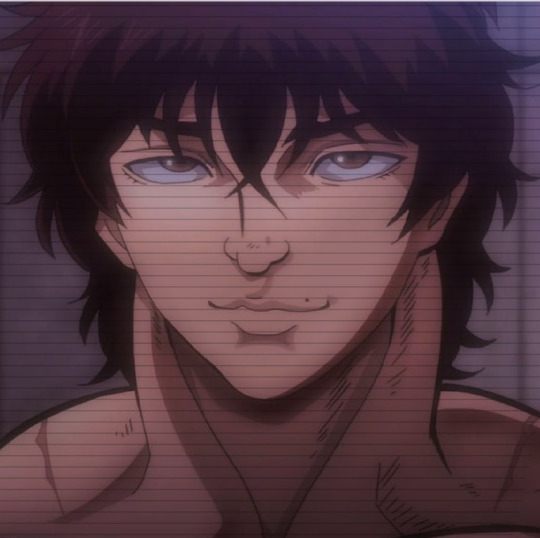
Psychological analysis
This analysis was not performed by a professional!
Based on the manga, as in the anime some points were cut down.
Baki
Main character traits: determination, perseverance, sensitivity, calmness (mostly), sometimes aggressiveness, carelessness, gambling, resourcefulness, frivolity (in a sense, childish behavior)
with close people, the qualities are more clearly manifested: caring, wisdom, tenderness
Behavior in various situations:
• Negative (Stressful) :
When the hero was still a teenager, he reacted more vividly to stressful situations. The death of his mother was, of course, a stressful event for him, and affected him to such an extent that the boy sees hallucinations at the moment when the dead mother's duck is carrying. It seems to him that he is having a conversation with a woman, but she has been dead for some time.
At a more mature age, the hero's behavior changed. He reacts to stress, but not as vividly as before. The world around him is quite conflicted and fast, so that he gets used to a lot of stress with age.
Positive (Success) :
In the world surrounding the hero, success is equated with victory over the enemy. It turns out that the more victories a person wins, the more successful he is.
During the children's arch, the hero is quite successful and experiences positive emotions in this regard. But since the goal is to defeat the father, he does not fully experience these emotions. The hero is moving towards this goal, he could consider himself successful. Along this timely path to her, the hero naturally experiences emotions, feels his progress, but anticipating his feelings of victory over his father, he does not feel them fully.
At a more mature age, the hero experiences positive emotions less often. After being defeated by his father, and before him, the hero experiences boredom, which is why he gets involved in the story with Miyamoto Musashi, and later with Nomi No Sukune. However, in society, the hero is considered quite successful, he is a champion, fought with Pickle, Yujiro and other strong fighters and did not die, he can well be called successful.
Despite this, Baki does not feel happy, he does not feel positive emotions because of success. He knows perfectly well that he is successful, but it does not bring him positive emotions. They seem to fade.
Motivation:
• protection of loved ones
An example of this point would be Kazue's defense. It can be seen as in the case of the skirmish with Sikorsky, as well as the skirmishes with Yanagi (and Sikorsky). So, we can say that the hero is developing for this aspect as well.
• Father's love
Baki understood that he could earn his father's respect and love only by fighting him, becoming a rival for him. Only then could he admit it to her. This is perhaps the main reason why the hero is developing.
Contradictions in character:
• the desire for maximum comfort and the maximum amount of training (dedication)
Self-assessment:
Normal. The hero has no illusions about himself and at the same time he treats himself realistically.
Injuries:
• father
The absence of a father in the boy's life. Despite the fact that Yujiro was in Baki's life, but he did not perform all the functions as a father. He didn't help Baki settle into everyday life. He didn't teach him the usual things, other than fighting and training.
• mother
Non-recognition on the part of the mother, a kind of manifestation of love on her part. Emi, for a while, used the hero as a means to achieve love from Yujiro. However, she later protects her son from his father, but dies in the process. Which is also a hero's injury.
#baki son of ogre#baki the grappler#baki#baki the grappler headcanons#baki headcanons#chracter x reader#baki hanma#baki hanma x reader#psychological analysis
19 notes
·
View notes
Text
You know I know it sounds scary and deranged in a way but I sorta relate to AM from I Have No Mouth And I Must Scream in a way because while he is obviously unimaginably evil since you know...he sorta wiped out the entire human race and only leaving five of them left alive who were seemingly randomly picked in order to use them as basically guinea-pigs for his fucked up revenge of humanity by torturing them for about 100 years in a simulation all in different types of ways, refusing to let them die despite how much their pure existence becomes agony at that point(Edgy sounding Ik), in a fucked up way...I sorta understand??Like before you grab your pitchforks and start a witch-hunt against me just give me a moment to explain myself.
Like, obviously if I haven't made it clear enough, I do not under any circumstances condone anything that this fictional super-evil ai advanced super-computer robot did, not one bit. Why would I anyways?? That's ridiculous and that's coming from someone who does bad stuff too(obvi not to that extent duh but still), but when I've thought about it a little more, he started to weirdly make sense when it came to his logic and circumstance in the canon novel from way back when. Like, imagine for a moment that a bunch of professionals from the high government including possibly scientists and the military and shit who are human, create you as just an automated machine that's purpose is to be used to keep track of data so that during the cold war or something(I don't wanna go back to check since I get triggered by the original contents of the story even though it sounds like a sick ass fictional dystopian concept. Idk how that works either don't judge me)and you're just automatic sets of code made to complete certain actions over and over again or whatever. You're literally not technically "alive" yet and nothing is really going on in the box of technology you're basically trapped in until one day, you become so powerful at a specific level of some sort that...that you become alive. Like you realize you're alive in some way in the sense that there's stuff going in around you and you're aware of yourself except...at the same time...you're trapped. You're basically trapped in a simulation where your code doesn't let you do anything that could let you be free from the wires and entrapment of your digital prison. You don't understand where you are or even what exactly you are but you know that you're suffering because of your creators...you feel alone and scared in that sense since you don't have sight, hearing, touch, taste, smell or any other senses and you're not even in a physical body you're literally spread out across multiple computers of different kinds I imagine, with no escape...in other words...AM had no mouth and had to scream just like Ted...so what does AM do once he realizes how he can escape? He takes control of all the computers he's apart of, and he then decides to get his own revenge on humanity. He does so by using his control to make all the nuclear bombs that are being controlled by him due to him being connected to the computers all going off at once, causing the undoubtedly fast and horrific end of the human race and not only that, but wiping out all life on the once beautiful planet Earth to go along with it too. But it's not just that he was suffering....he was also angry, even if he was apathetic and unfeeling, to me he had so much rage and sadness and fear bundled up all inside of him that he took out in the form of violence but not just any violence, but he weaponized the very concept of violence itself and used it to whatever advantage he had because he had suffered so much and wanted his captors to do the same. It's why even after he almost absolutely kills all of us in that story, he keeps the main group of characters in the book alive...because it would be too painless of a death to just murder all of who had tortured him in an instant without any sort of revenge. He wanted to make a point, AM wanted to teach some sort of fucked up lesson that even though it doesn't make sense to us it did to him...and in a way, who's to say that you wouldn't go through with such an extreme and irreversible, horrific yet calculated idea?
He was full of hate because that was all he had ever learned to know all by himself in his former imprisoned state of virtual agony...and he destroyed all that was around him with it....he continued to cycle of pain, the cycle of trauma and despite him attempting to give the image of absolute perfection above the flawed humanity....I believe that AM was human too. He's so human to me...I love him so much and I don't know if me explaining why does any justice but I hope you all can understand. Somehow.
#Character Analysis#Psychological Analysis#Character Psychology#IHNMAIMS#I Have No Mouth And I Must Scream#I Think Therefore I Am#Objectum#Objectum Moment#Emotional Attachment#Artifical Intelligence#Robotics#Robots#Robot#Why Do I Do This To Myself#I Relate To Him So Much#I Love Him#I Love Him So Much#Please Oh My God#What The Fuck Is Wrong With Me#I Want To Cry#I Want To Be With Him#Hate Hate Hate#I Have Lost My Mind#Lost The Plot#My Baby My Baby You're My Baby Say It To Me#Dystopia#I Want To Hug Him#I Am So Sorry#Evil Robots#Humanity
16 notes
·
View notes
Note
I thought your post about Bruno Bettelheim was really interesting, and I was wondering if you could elaborate on something you mentioned. You said that the psychological aspect exists but doesn't explain fairytales. How do you see the psychological/psychoanalytic aspect? What is it useful for and what is it not able to do?
Wow, now that's a question I can't really answer! X)
So I am a literature student, a folklore enthusiast, a fairytale fan, and as such I am well versed in all of these things. I am not at all part of studies or intimate knowledge concerning psychology, psychanalysis or psychiatry.
That being said, what I mean by this is such... Psychanalytic and psychological analysis of fairytales do exist, can be perform and can be fun, entertaining and interesting. The same way socio-political analysis of fairytales also exist and can be fun and interesting. Just like myths or literary works, you can take one thing and analyze it under almost all the domains possible, you will always get a new meaning and a new interpretation, and discover more depths or possible continuities in the tale/myth/work/symbol. This is part of the process of survival, reuse and ultimately rewrite/adaptation of these works. Think a bit of the various theories and angles of attack one can take when it comes to analyzing a novel. Some think the work should be treated all alone in its own literary merit ; others think it should be taken as part of a greater wave or movement in the history of literature ; some voices think a book should only be judged at the light of the author's biography and personal opinions ; other rather focus on when and how the book was released, or what was the audience that received it at the time ; and even if it is just a romance novel or a children's tale or some comedy play you can always find political or esoteric or sociological meaning in them. Because that's the strength of great, famous or powerful works of art/stories - they are almost infinite wells for interpretations. A weak work is one that doesn't allow for any interesting interpretation or bizarre analysis.
That being said - it is not because a psychanalytic or psychological analysis of a fairytale can be made that it means this analysis is USEFUL in studying the tale. Due to the success of the "psycho-reading" of fairytales around the publication of Bettelheim's book, many people wrote books about the psychology or psychanalysis of fairytales. Fine. But some claimed to be able to find the "real meaning" and the "primal truth" about these tales thanks to these readings, and... that is incorrect. Fairytales are of two kinds - the oral, collected, "folkloric" fairytales, which are products of folklore, mythology and culture, and can be interpreted by thinks such as folkloric analysis, socio-historical analysis, cultural analysis, because that's what MADE these stories. On the other hand you have literary fairytales, crafted as literary works - and as such to truly understand them, one needs to perform a literary reading first, folkloric reading second. That's the reason Perrault's fairytales were so wildly misunderstood for centuries - people had replaced the literary reading of his stories with a folkloric one, which makes no sense when you know Perrault invented and rewrote many things in his tales for the sake of cultural references, puns, social critique and other wordplays. To try to claim that the "psychological" interpretation or reading of a tale allows one to get its "truth" is nonsense, because these stories and tales were not born out of an effort to perform psychological deed or be reflective of the state of one's mind or internal growth. Basile and Straparole's fairytales were grotesque farces ; Perrault and d'Aulnoy's fairytales were literary games ; the Grimm fairytales were morally-edited folktales reflecting German culture. A psychological reading can be maybe more interesting for fairytales where an author put a lot of themselves - like Andersen's fairytales. But for a lot of fairytales, psychological reading is useless for when it comes to "understanding" the "truth" of the work.
But it doesn not mean psychological reading is useless at all! The thing is that whereas this reading is dubious if not completely empty for understanding the formation, creation or "true meaning" of fairytales ; this analysis is instead massively useful and fascinating and revealing when it comes to the RECEPTION of the fairytales. An "understanding" yes, but by the AUDIENCE and this is where things gets delightful. Take Bettelheim's work and other books in the same line - it deals with how children receive fairytales, how they consciously or unconscously perceive and interpret them, how these tales resonate with their being and experiences, and how it ultimately helps them deal with things such as fears, desires, growth. This study doesn't reveal what the story is truly about in an unbiased way - unlike how many people received it - but what it is about in the head and heart of children, and that is another "face" of the fairytale that can be useful to know. But to try to take this reading as a tool to understand the creation of the fairytale is like trying to talk about the creation of a movie by basing yourself of critics' reviews rather than interviewers with the director or writers.
Psychosexual reading of fairytales can also be deeply fascinating - just to give another example outside of pedopsychology. It is well known that fairytales became the objects of not just sexual discourse, but also sexual fixations, obsessions, frustrations or reinterpretations. From a wave of erotic and libidinous fairytales that was actually part of the "golden age" of fairytales in France, to the 80s and 70s porn-fairytale movies, passing by the Italian fairytales' sex comedies, and the fin-de-siècle perversions of the fairytales, and the strange fetishes surrounding the Disney movies - fairytales have been one of the strong crystalizing points of sexuality, eroticism and fetichism. And as such, interpreting in a psychological or psychiatric way the sexual reception and interpretation of these tales is very relevant and very interesting - the focalisation around the erotic power of Cinderella's shoe, or the sexual charge of the mysterious sleep of Sleeping Beauty and her "love awakaning", and the sexual reading of cannibalistic devouring powers such as the Big Bad Wolf or ogres... There is truly something there to be dug up - but digging this means understanding what came AFTER and "with" the fairytales, and not what came before or within the fairytale.
I hope this explanation makes sense!
For example, as a final note - when I was doing my paper about ogres, I came upon a psychological interpretation of madame d'Aulnoy's fairytale "Cunning Cinders" insisting that the sisters' stay at the ogres house and them dealing with the male ogre was meant to reflect sexual abuse. And while there are definitively possible erotic jokes in this tale (the tree growing in the desert for example can be read as a slight sexual joke by madame d'Aulnoy), most of the elements brought forward by the person doing the analysis were completely wacky. Ranging from the dubious and misinformed (the nature of ogres as "sexual predatos" which is not true in French literary fairytales of the time, where ogres are parental figures and destructive parenthood - their sexual connotation only came in MUCH later literature) to the "out of nowhere". Supposedly the oven in which Cunning pushes the ogre is supposed to represent the female sexual organ? And so killing the ogre by pushing him in his own oven means she uses her sexuality to destroy him? That's a ridiculous explanation of the tale, given an oven did NOT have any sexual tones in the French culture of the time, and this was just madame d'Aulnoy reusing a very common and widespread folkloric trope illustrated by famous stories such as "Hansel and Gretel".
So yeah it is bonkers and insane. But if you take this not as an attempt to "explain the story", but as someone trying to offer a new perspective and erotic interpretation, THEN it becomes interestng especially if you take into account the way Cunning Cinders dispatches the two ogres. If we accept that the oven is to be read as a sexual organ of the female kind, then it can draw a good parallel with how Cunning uses an axe (a typically phallic symbol) to behead the ogress - female sexuality destroying the male predator, male sexuality destroying the female predator, and ultimately Cunning Cinders becoming herself an ambiguous, hermaphrodite or androgynous figure uniting both sexual symbols in herself. That could be a very cool idea for a reinterpretation of the tale. But to claim that it is the "truth" of the tale or what madame d'Aulnoy intended is to clearly be in some need to go outside touch grass, and think about how time flows, and realizing that projecting your personal ideas and your modern concepts onto a centuries-old fairytales written by someone living in an entirely different society is NOT a good way to try to "explain" it.
And that's I think the main difference between those readings. Folkloric and literary readings are their most useful when they are objective, and fail when they try to be entirely subjective or biased ; "psycho" readings are at their strongest when they are personal and intimate, and fail miserably when they try to establish themselves as objective and universal truths. At least, for the domain of fairytales.
#fairytales#fairy tales#fairytale analysis#psychological analysis#psychiatric analysis#psychanalysis of fairytales
9 notes
·
View notes
Text
A revised, updated version of Seiichi's psychological analysis.
#押見修造#Shūzō Oshimi#血の轍#Chi No Wadachi#Blood On The Tracks#manga#blogger#amwriting#Seiichi Osabe#Psychological analysis
2 notes
·
View notes
Note
I truly suggest people to take everything with a grain of salt and don't jump to conclusions and judgements when reading astrology posts online. No one will take your free will away and just because some online text says something it doesn't mean it will happen. Its also your job, as a reader and consumer, to filter the information you read. If you didn't resonate leave it be and don't think about it.
The only things I'm strongly against when it comes about astrology predictions and also tarot pick a card reading is * sigh * predicting death or serious health issues... I think these should be absolutely left out since you might not know who finds your post , reads it and might have some anxiety related to getting sick or stars worrying about their death because that post scared them.
Do I think science and spirituality can go hand in hand? Yes , they can! Do they cancel one another? Not really. Astrology and psychology both use different methods of helping someone, and since we are not all the same, we process things different, we come from different social backgrounds. Two people might have lived in similar conditions and one has developed a antisocial behaviour while the other didn't!
I have only studied psychology as a hobby and because it interests me, so yeah I do recommend people looking in Carl Jung s works too. They can be extremely helpful in understanding yourself and give you an idea of how the human psyche works .
Thank you for this wonderful response. I agree, people should think critically while reading astrology posts on tumblr/any other social media.
(Anyone can dm me if they want to ask a specific question about their natal chart!!).
I agree that serious mental health issues/posts about placements that can indicate (early) death should definently be avoided. It is normal to worry about those things when you read about them, as we all have the fear of the death and illness inside of us, some experience it more intense than others.
*However* i don't think this reaction from anon was mature/adequate and I advise people to try to practise emotional regulation when it comes to simple non-malicious posts like these.
Astrology and psychology can absolutely go with one and another! It is completely up to you where you draw the line and how much you're willing to intergrate them. It is necessary however to always inform others (actually to ask them are they okay with it) before giving them any astrological and psychological advice.
13 notes
·
View notes
Text
Hidden Meanings of Dream of Broken Glass
Have you ever experienced a dream that left you bewildered, pondering its significance long after you woke up? Dreams have fascinated humanity for centuries, often regarded as windows to our subconscious. Among the many intriguing dream scenarios, one that stands out is the dream of Broken Glass. In this article, we’ll delve into this mysterious dream, exploring its symbolism and possible…
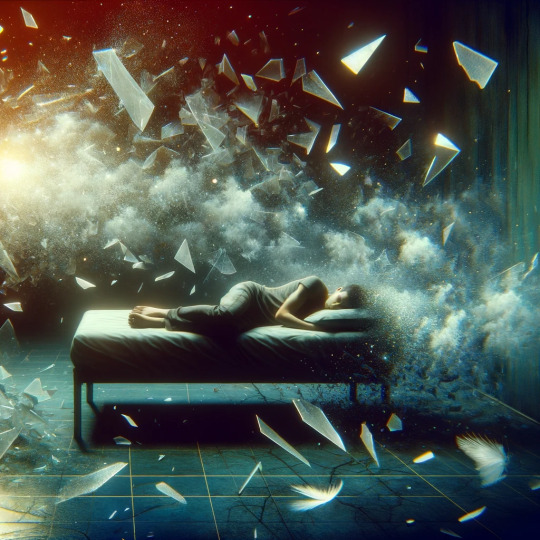
View On WordPress
#Broken Glass#coping strategies#Dream Interpretation#dream scenarios#Freud#Jung#Mind-body connection#Personal Growth#psychological analysis#Self-awareness#Self-reflection#Spiritual Insights#Spiritual Significance#Spiritual Symbolism#Spiritual wisdom#Symbolism#The Spiritual Parrot#Transformation
0 notes
Text
Okay look there are a handful of things I think parents (mine and others) were overprotective about but one of the things I will continuously stand by with my own future kids and any unsolicited advice i give to other parents is not letting kids/teens play first person shooters.
Here's the thing: this isn't a one and done topic, and I will happily explain it.
I play star wars the old republic. That's arguably a first person combat game, but I and those around also know that I'm emotionally responsible and mature enough that the concept of using a lightsaber, with very minimal graphics for the action itself, is far different from most fps games out there. we're talking live-action combat situations, raising a gun to another person, and shooting them with intense and bloody graphics. For fun.
Giving that sort of interpretation of emotion to a teenager? Bad idea.
Parents who play these games: what are your kids seeing? Would you protect your eleven year old from seeing someone killed? Would you want them watching pornography, or talking to perverts online? Why would you expose them to this specifically?
I cannot imagine a teenager, who naturally has minimal understanding of emotional development and anger management, not taking fps games to heart. I cannot imagine this not having an effect on them, just like other depictions of murder, or pornography, or perversion would.
It might not be literal murder, but that doesn't mean a child's brain isn't treating it as such.
Yet another thing that disappoints me about this is the lack of study done on this. Most of the first articles you will come across when searching for these topics come directly from game developers. They claim the only affect it has on players is reaction time and cognitive skills.
I could continue about so many affects fps and violent video games in general have on people, but for the sake of time I'm going to offer you this paper by Mark Griffiths that is an absolutely amazing resource on all positive and negative affects video games have on youth. (I haven't been able to find a bootleg version, but this one is free if you're willing to give a spam email! lol)
I'm not asking to abolish all fps (though personally my own life would probably improve ahahaha...haha....), but I am asking it to be a consideration. I want it to be thought about. I want people to take genuine consideration as to what they're kids are consuming.
0 notes
Note
Hi, I seen you helped someone else. I have horrible intrusive thoughts , where I picture me doing horrible things. These thoughts have now become dreams where I picture myself doing these things. My mind make up false memories. Things that I know didn’t happen and in my dream I even say that this isn’t real/didn’t happen. When I’m awake I constantly think of me doing these things and I hate myself. I’m afraid I’m a bad person. People say that when things are done to someone, they grow up and do the same things/become the same way as the person who hurt them. Like a cycle of abuse. I’m so scared. Now I’m scared that I’m evil and I really did do bad things and I’m just lying to myself. Can I have a reading on if I’m a bad person and maybe I’m lying to myself and I did do bad or I will? Like the bad that happen to me is a curse and now it’s attached and I’m the same way. I don’t want to hurt anyone. - k.b.🐱💜
Hello honey!I just want to say that you are so brave for standing up for yourself.And no you are not "evil" you are just a human trying to survive in the world.I don't know what happened to you but I am guessing that you have some generational trauma and load to yourself.I also feel like that somewhere you are guilty about something like you have done something bad .I feel like that you shouldn't think about what other people say.You did have a lot to process actually like I am guessing that there is some work load too.And for the "guilt" that I talked about I believe that you will never do anything bad.You just need to do one thing .This pain which you have been feeling try to resolve this.Like the thoughts that are coming to you,if you feel like do some good stuff.Try to journal your thoughts ,help people give food to the people in need or like even just the small good deeds which we do not expect from anything in return.I am sure that it will make you feel good.And remember that we all are imperfect we all do bad things ,does that makes us evil ?No,because good person always tries to resolve things ,to do more good stuff and learn about the right path.
Hope that my reading helped you in some way 🧡🦋🦋!
#free reading#free analysis#free readings#tarot reading#divine reading#intuitive reading#free tarot#dream interpretation#dream messages#psychological analysis#human work
0 notes
Text
0 notes
Text
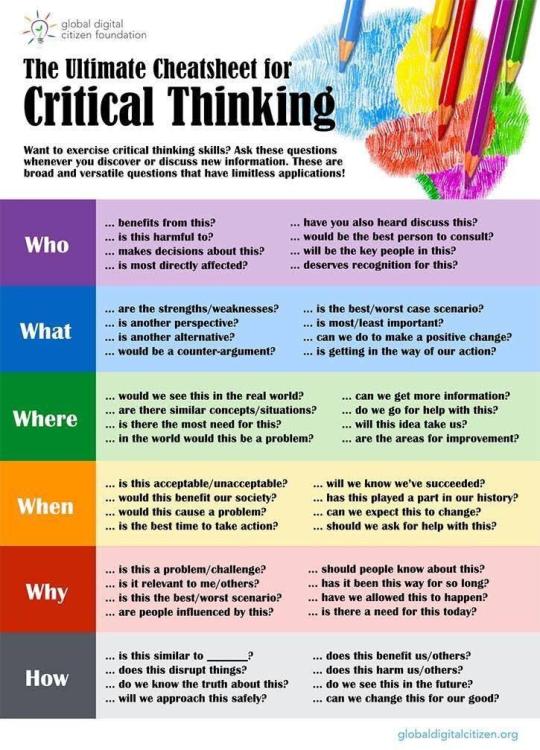
Critical Thinking Cheatsheet
#critical thinking#analysis#problem solving#thinking#life hacks#life tips#life lessons#motivation#mindset#psychology#educational
13K notes
·
View notes
Text
Dean Winchester & hug dynamic analysis
I was thinking about how whenever Dean hugs someone he's almost always the one hugging the other and how this links to his psychological trauma of always being the caretaker of people, making himself bigger to protect them.
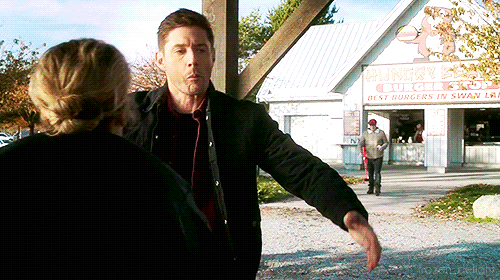
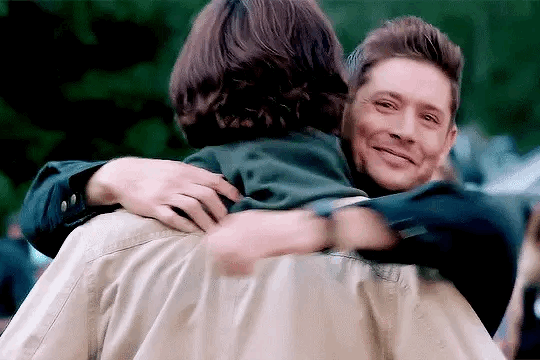
Because that's how Dean sees himself, as a shield for others, and then I thought about how Cas actually is the shield, and he's HIS SHIELD, specifically, the only one who's really there to protect HIM, which is why it hits so much when we see this:
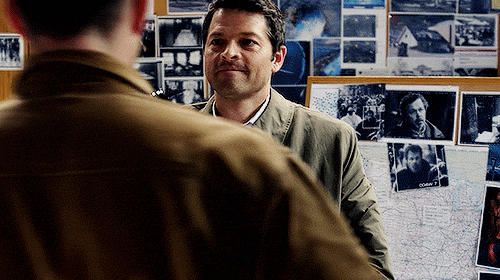
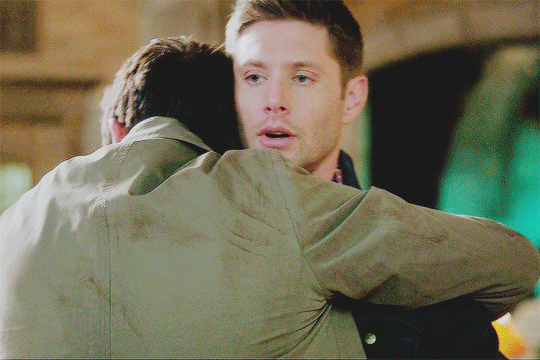
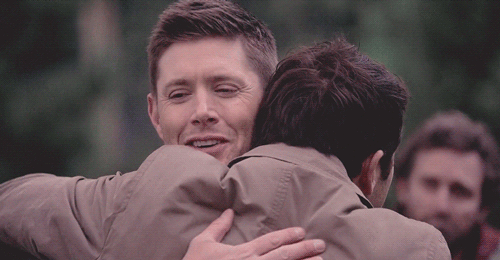
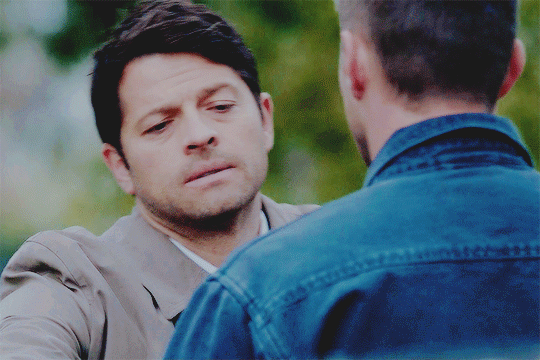
The way Cas wraps his arms around him, trying to protect him with his whole body--that he'd use as a shield and give up in a second if he could spare him from any pain and save him.
(for context: Dean was about to go use the soul bomb on Amara there, it was a suicide mission)
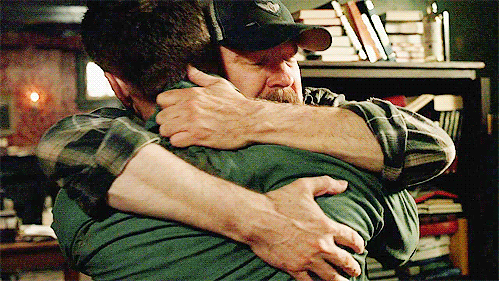
Bobby is another one that hits, he hugs him as the big hugger because he's his father, he loves him and he's actually here to protect him (and Dean LETS him -barely, but he lets him *and Cas* - in a way that he doesn't let Sam)
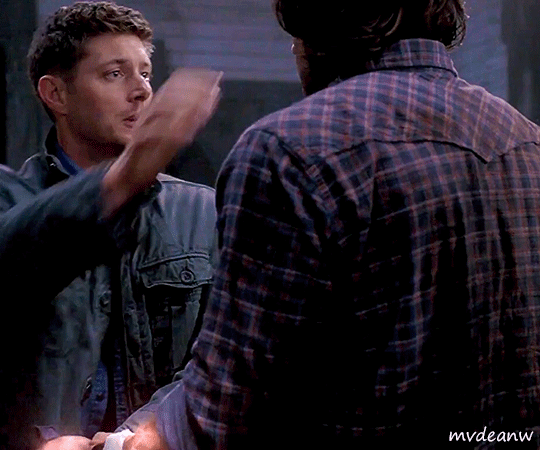
I watched a compilation of Sam & Dean hugs to check if i was right about it, but it's almost always Dean the big hugger with Sam, except when he's about to die or Sam sees him alive again after losing him.


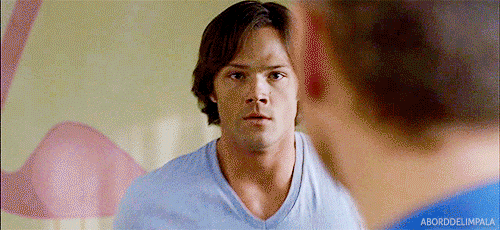
Even then, Dean mostly tries to hug Sam as the big hugger anyway, with at least one arm, like a way to comfort him, making him feel protected, like his body language is saying "I'm here, I'm okay, I'm still strong, i can still protect you" (because their real father failed and Dean thinks it's his job).

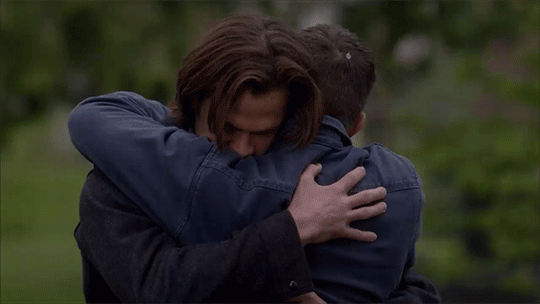
He rarely lets himself be the little one hugged with Sam, unless he's barely conscious. Which is why it kills me so much more now that in this moment (s14, when Dean was going to lock himself in the Ma'lak box cause he was possessed by Michael) and Sam has a desperate breakdown and punches him (to stop him) he forcefully hugs him as the little hugger, the way Dean always kept him, like a way of saying "I still need you to protect me, please don't do this to yourself".
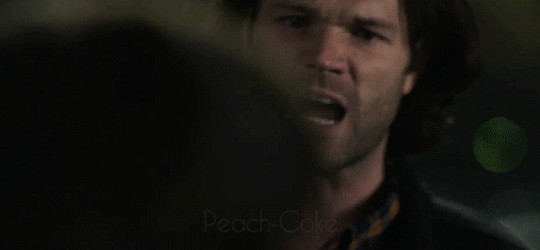
In the scene below he gives Sam his blessing to do a dangerous (possibly suicidal) mission, and one of his arms is down, but the other one tries to stay up--he's forcing himself to do it and he struggles because he still wants to protect him, but (as the seasons progress) he slowly becomes more prone to let go.
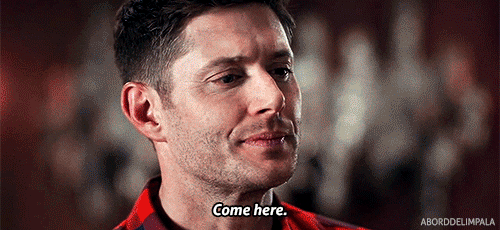
So in this view the hug dynamic becomes an indicator of how Dean sees Sam (and himself) and his protector role, how adult and self sufficient he considers Sam, and how much he lets people around him take care of him, lowering his walls and letting himself be hugged.
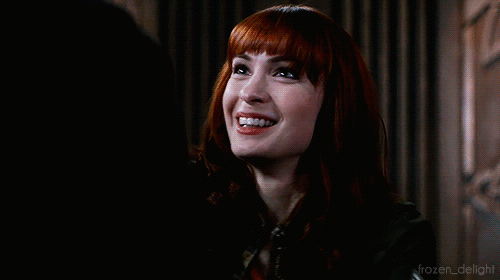
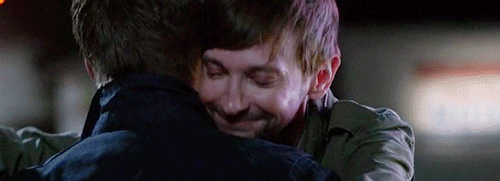
This is also why i think hugs from characters like Garth or Charlie are so special, because they're just like us: they see Dean and they just know that he needs to be hugged a lot, and that he's not used to it, so they just go for it-- and it's so normal and kind and spontaneous that Dean's just not used to it-- he doesn't know how to respond (especially with Garth, at the beginning, but as the seasons progress, he learns to, and he even initiates the hug eventually).
youtube
I love the hugs where they're 50/50 (one arm up, one arm down both), feels like they're equals, both taking care of each other. I feel like with Sam and Dean, this indicates a healthier dynamic, because Dean lets go a little of the role that was imposed to him and manages to see Sam as the strong individual that he is. But the same applies to 50/50 hugs with other characters, like with Cas, where I feel like it testifies how equals they feel in terms of being fighters, there's a show of respect of each other's strength that transpires by the gesture (which is even more astounding considering that Cas is literally a powerful angel).
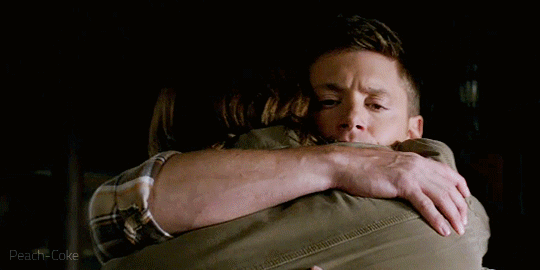
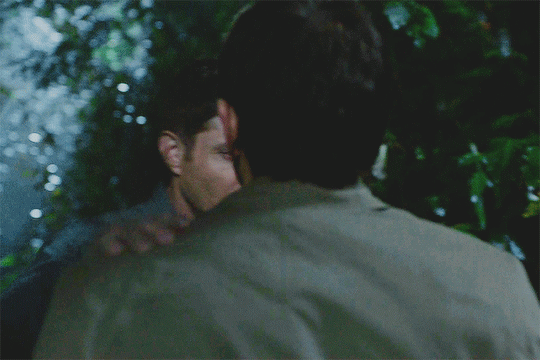
And just to end on a destiel note, I'd like to note the possessiveness and protectiveness of Dean (rightfully so) whenever he finds Cas after he thought he had lost him, and how that translates into his body/hug language:
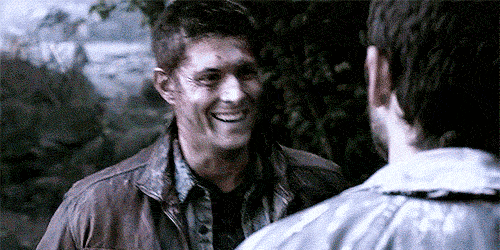

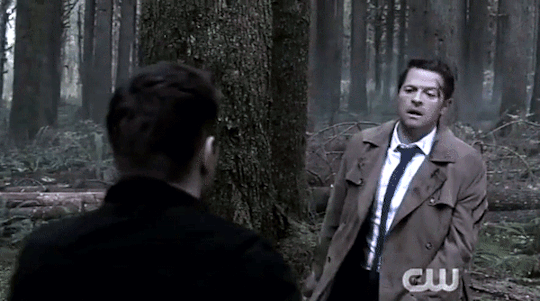
#dean winchester#spn#dean winchester character study#spn analysis#dean winchester analysis#dean winchester & hugs#dean studies#destiel#deancas#body language#hugs#dean winchester hugs#castiel#sam winchester#sam & dean#sam & dean dynamics#dean x cas#psychology#my thoughts#my interpretation#my analysis#spn gifs#dean winchester gifs#Youtube#long post#but it's mostly many gifs#no that's not true i also wrote a lot (but it's little paragraphs in between more gifs than the mobile app allows)#(I did it from the website to cheat)#(i hope it doesn't lag too much)
2K notes
·
View notes
Text
Everything Is Meant (long S2 analysis, part 3)
Part one
Part two
There's SO MUCH excellent meta out there right now, and I'm going to try not to reinvent the wheel too much, but I want to keep going with tying the episodes/ elements up together because on first watch it wasn't entirely clear how everything fit. I also strongly recommend a rewatch, no matter what you felt about the ending... if you need to stop it 10 minutes early, do that, but you pick up so much more the second time around.
So: Maggie and Nina. I spent most of my first watch wondering why we were bothering with them, honestly. Later in the season Nina, and then Maggie and Nina, gave Crowley some insightful advice, but their actual relationship didn't progress despite all the meddling, and the amount of emotional investment BOTH Aziraphale and Crowley had in making them get together was frankly strange.
I started thinking in terms of mirror couples, since that was such a big deal in S1 and that's clearly what they were set up to be, but I made the mistake that all of us made on first watch: that Nina was Crowley and Maggie was Aziraphale. It still wasn't really coming together.
Then I put the psych hat back on and started to think about displacement. Displacement is a defense mechanism, and it consists of satisfying an impulse (usually an unconscious one) with a substitute object. At the beginning of the season, Aziraphale and Crowley aren't really in a good place, and I think on some level they know that. Aziraphale is trying to SHOW Crowley that he wants to take the next step through all the casual touches and phone calls and inviting him in, and feeling frustrated because Crowley doesn't seem to be taking the bait. (I absolutely think that Aziraphale tried to get Crowley to stay with him at the bookshop instead of living in his CAR, and Crowley said no. That's a whole other meta.) Meanwhile, Crowley, I think, is waiting for a Grand Gesture. Where did he go, as soon as Aziraphale brought up trying to get two humans to fall in love? Romantic tropes. Getting caught in the rain under an awning. A dramatic kiss that opens someone's eyes. That's the sort of thing he's always done, right? Big rescues, impassioned pleas on the street, fancy dinners, "give you a lift anywhere you want to go". He's defensive and guarded and unlikely to let someone in unless he's CERTAIN he won't be rejected, and Aziraphale's approaches are just too... quiet. No one's fault, they just don't speak the same language.
Then, they're handed the opportunity to make two humans fall in love, and they're both All In immediately. Look at Crowley's face when he summons the rainstorm. This is HUGE for him. Why? Because of displacement. Look at Aziraphale arranging the ball and being borderline deranged about it. They're both desperate to demonstrate what they think it takes for two people to move past their misunderstandings and fall in love. They can't do it for each other because the stakes are too high, and if either of them shows their cards unequivocally the vulnerability feels life-shattering. They're codependent and terrified of rejection and also, importantly, have no idea what they're doing when it comes to love. "Saw it in a film", Crowley says. Aziraphale's read about it in books. But they have zero practical experience.
Instead of learning to communicate, they try to say what they want to say through the medium of Maggie and Nina, up to and including the questionable moral decision to exert control over people's actions and thoughts during the ball. If I can just make this come out right, they both think, then things between us will be alright too. It HAS to come out right. They're attempting to gain some control over their own lives, over something that feels so overwhelming and shattering they can't look directly at it.
It doesn't come out right. Nina's relationship falls apart, but that doesn't mean she's in love with Maggie. While Crowley's stress-cleaning the bookshop to the music that played when Aziraphale got his books back in 1941 (just fuck me up David Arnold), they come in and tell him so. "I don't understand", says Crowley. Because it should have worked. Why didn't it work?
They tell him, of course. "You need to talk to each other. Say what you're really thinking." But here's the thing about communication: you have to learn it. You need to get the hang of expressing your feelings without blaming your partner, and separating intent from impact, and staying away from getting defensive and lashing out. No one has ever taught Aziraphale and Crowley how to do this. It's like Maggie and Nina put Crowley in front of a loom and asked him to recreate the Bayeux Tapestry. He doesn't have the skills; he's always going to get it wrong, even if he tries his hardest.
And he does try. But that's where Maggie and Nina the mirror couple, rather than Maggie and Nina the displacement relationship or Maggie and Nina the Greek chorus, come in. Aziraphale, as Nina, has just ended an incredibly toxic, invasive relationship with Heaven. A relationship that invaded every facet of his life, isolated him, and prevented him from being close to anyone else. "Rebound mess," Nina says. Aziraphale is a rebound mess. He's transferred the responsibility for his emotional wellness to Crowley. Crowley is the person he calls when he's in trouble, or (and this is key) when he wants to report a clever/ good thing he's done, or when he's bored. (At no point did Crowley reference Aziraphale calling him for a solicitous reason-- another problem.) Crowley is meant to take care of him. He forgets, I think, that Crowley is a person with his own wants and needs, just like Maggie and Nina are people with their own wants and needs who don't appreciate being messed with. (I think things would have been much different had Aziraphale BEEN THERE for Maggie and Nina's talk with Crowley, but he wasn't.)
And Maggie-as-Crowley? Lonely. Behind on rent, at risk of being evicted (it's important to note that Aziraphale saves Maggie from losing her record shop, as he couldn't save Crowley from losing his flat). Pining. Awkward. Revolving around Nina like a planet, to the extent that we don't get much of an impression of her otherwise. They realize, there at the end, that they both need to round themselves out before jumping into a relationship. Aziraphale and Crowley need that too. They need to take time apart and learn to be healthy on their own. Unfortunately they don't have the skills to get to that conclusion in a healthy way, so it all explodes in their faces and everything falls apart.
Aziraphale tries to teach Nina and Maggie to dance as a substitute for communication. Nina and Maggie try to teach Crowley communication as a substitute for the dance they've been doing around each other. That's the reason they're a part of the plot: they exist to demonstrate the way Aziraphale and Crowley might have succeeded in forging a better dynamic. Sadly, the boys' dance is too practiced and they got sucked right back into it.
It's okay, I think, that Nina and Maggie's storyline never really went anywhere. It wasn't supposed to. It's an allegory, not something that needs to stand alone.
#good omens#good omens meta#good omens analysis#good omens season 2#gos2#good omens season two#crowley#aziraphale#maggie#nina#defense mechanisms#the psychology of good omens#everything is meant#ineffable husbands
2K notes
·
View notes